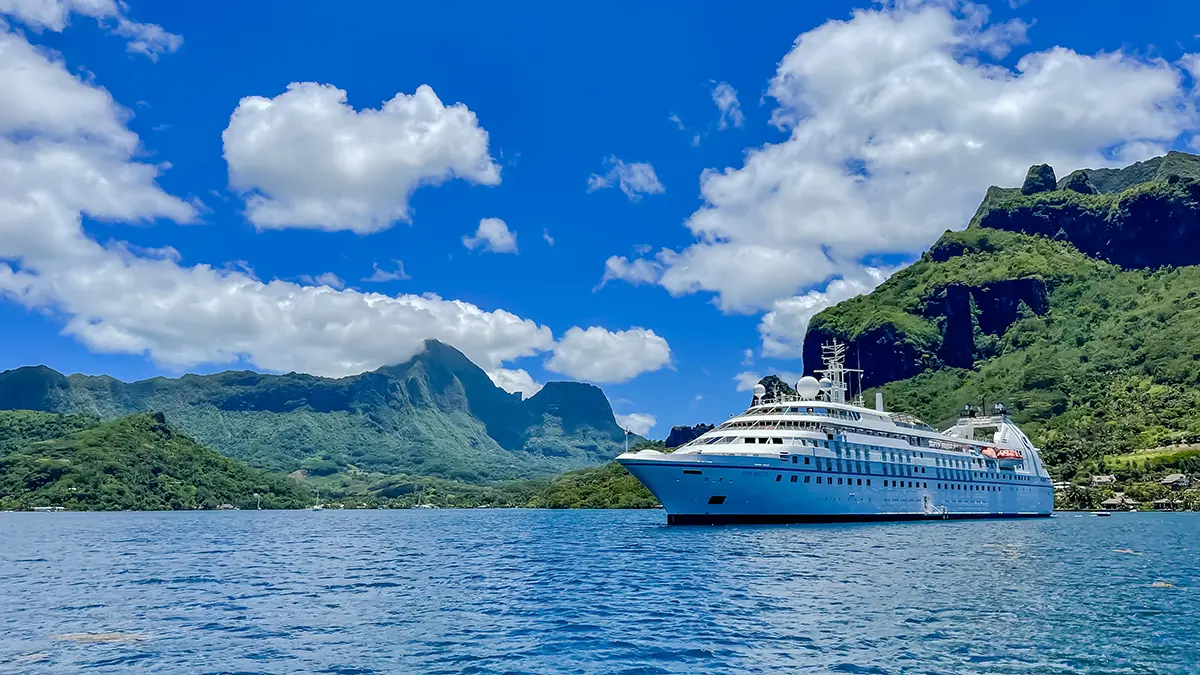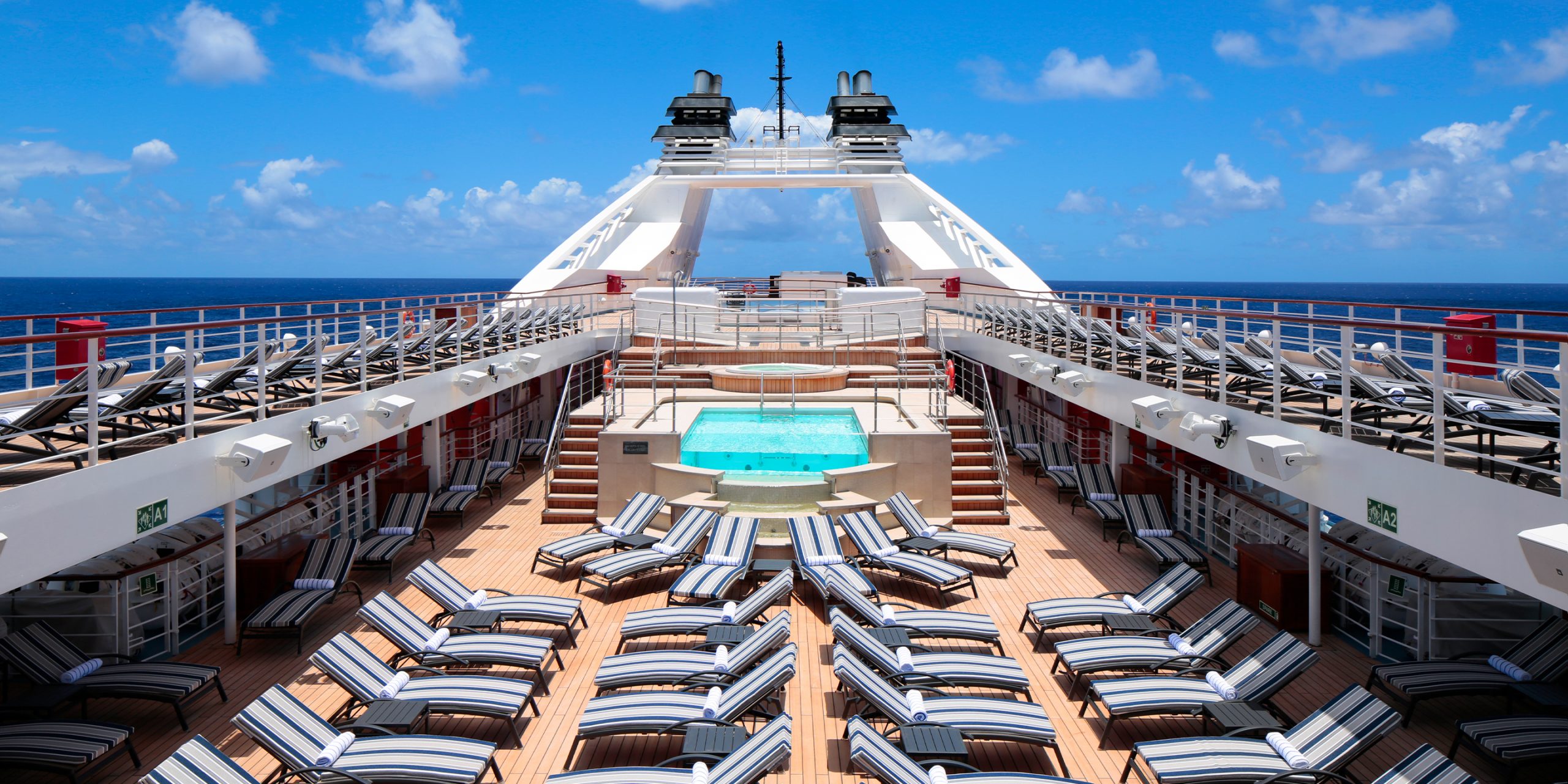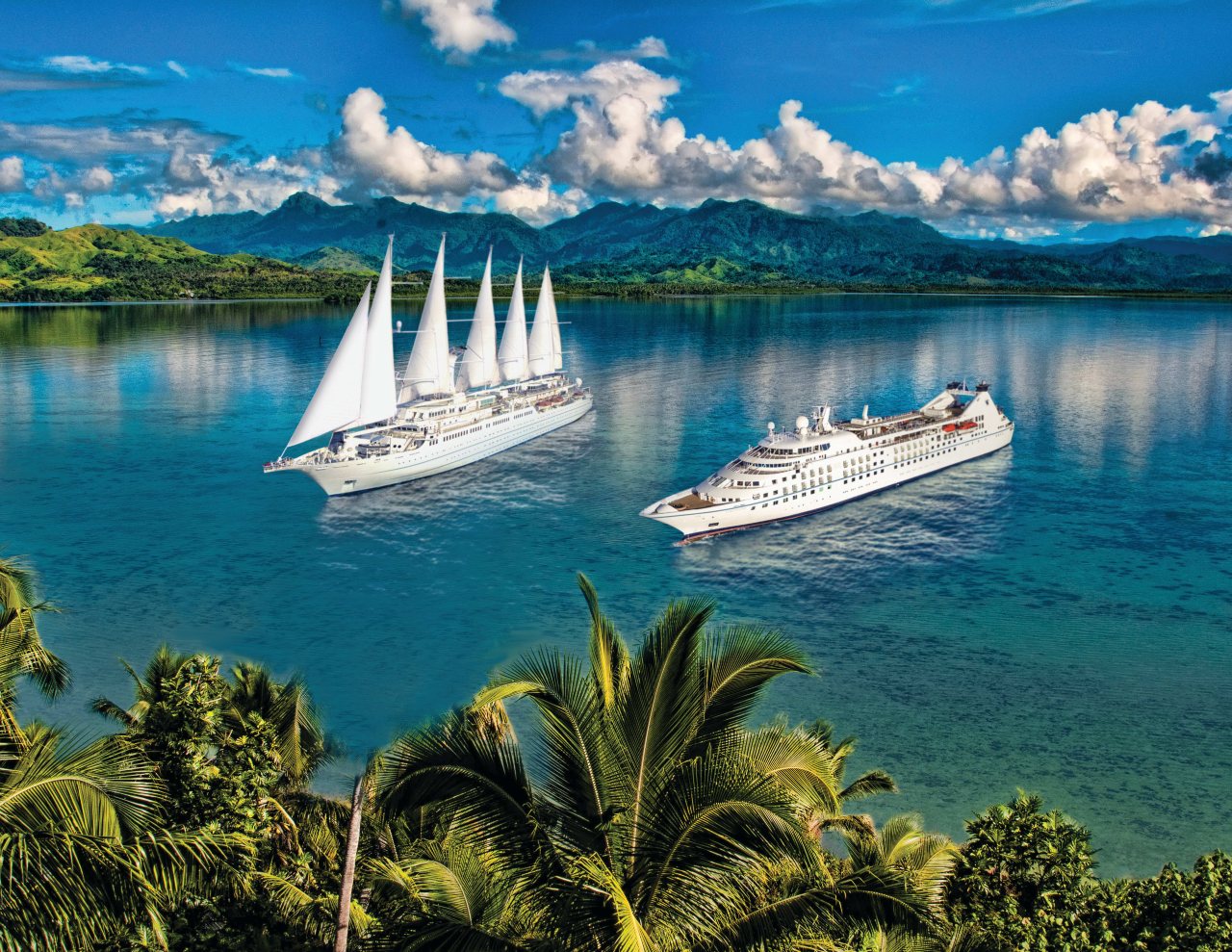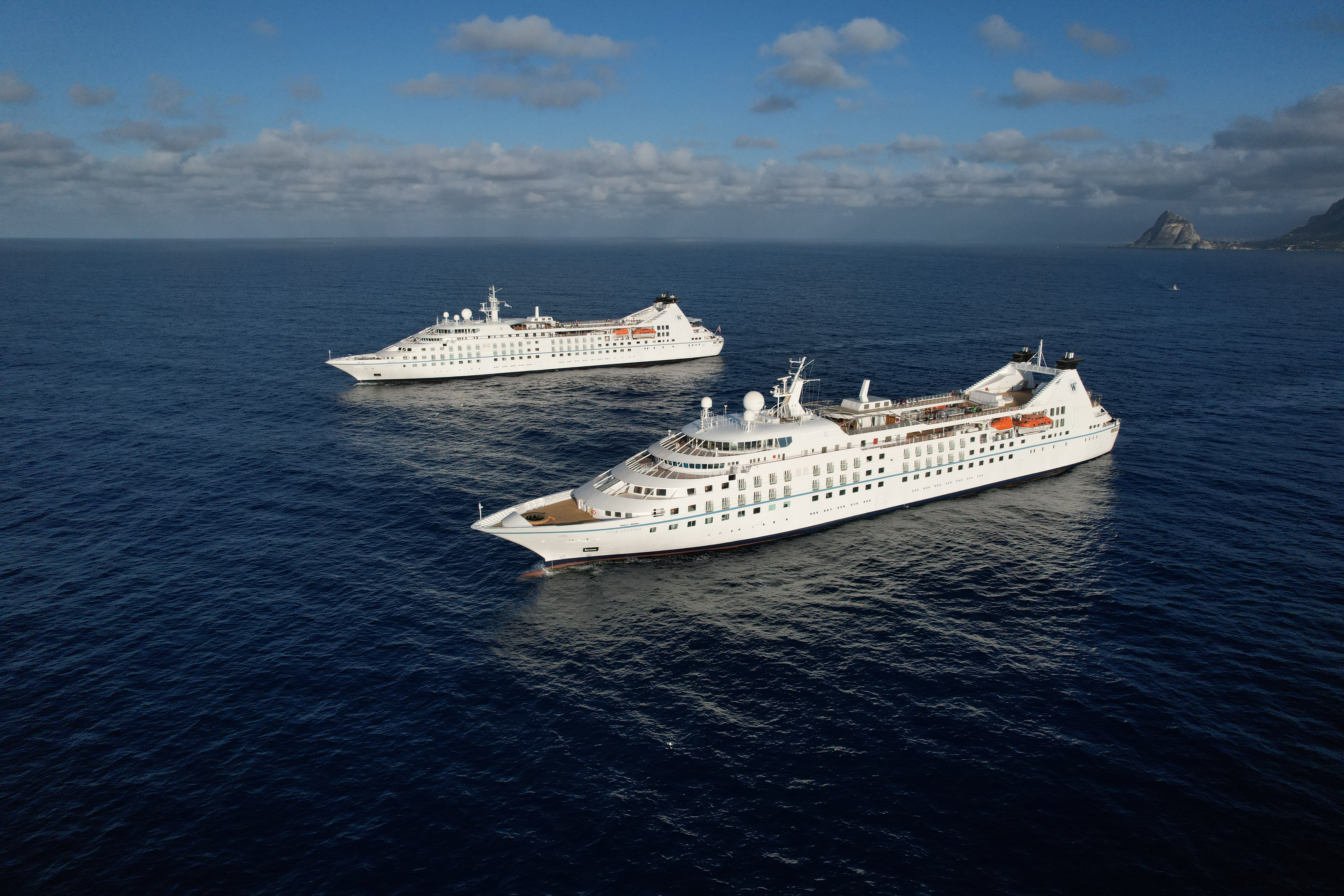Itinerary
Bordeaux as a whole, rather than any particular points within it, is what you’ll want to visit in order to understand why Victor Hugo described it as Versailles plus Antwerp, and why the painter Francisco de Goya, when exiled from his native Spain, chose it as his last home (he died here in 1828). The capital of southwest France and the region’s largest city, Bordeaux remains synonymous with the wine trade: wine shippers have long maintained their headquarters along the banks of the Garonne, while buyers from around the world arrive for the huge biennial Vinexpo show (held in odd-number years).Bordeaux is, admittedly, a less exuberant city than many others in France, but lively and stylish elements are making a dent in its conservative veneer. The cleaned-up riverfront is said by some, after a bottle or two, to exude an elegance reminiscent of St. Petersburg, and that aura of 18th-century élan also permeates the historic downtown sector—“le vieux Bordeaux”—where fine shops invite exploration. To the south of the city center are old docklands undergoing renewal—one train station has now been transformed into a big multiplex movie theater—but the area is still a bit shady. To get a feel for the historic port of Bordeaux, take the 90-minute boat trip that leaves Quai Louis-XVIII every weekday afternoon, or the regular passenger ferry that plies the Garonne between Quai Richelieu and the Pont d’Aquitaine in summer. A nice time to stroll around the city center is the first Sunday of the month, when it’s pedestrian-only and vehicles are banned.
Day itinerary:
Bordeaux has long been known as La Belle au Bois Dormant, Sleeping Beauty. And while the beauty part is undeniable, the sleeping part could be argued. Sure, the region is filled with treasures from long ago, including more than 350 historic monuments and buildings in the city alone. But the capital of Aquitaine is also home to a vibrant culture and, as oenophiles well know, is the gateway to some of France’s most famous vineyards. In this UNESCO World Heritage city, 13th century cathedrals and 18th century palaces are commonplace. Venture beyond the city’s borders to the chateaux of the Médoc region or to Saint-Émilion, a breathtaking medieval village set among the vineyards that is also a UNESCO World Heritage Site.
Bordeaux as a whole, rather than any particular points within it, is what you’ll want to visit in order to understand why Victor Hugo described it as Versailles plus Antwerp, and why the painter Francisco de Goya, when exiled from his native Spain, chose it as his last home (he died here in 1828). The capital of southwest France and the region’s largest city, Bordeaux remains synonymous with the wine trade: wine shippers have long maintained their headquarters along the banks of the Garonne, while buyers from around the world arrive for the huge biennial Vinexpo show (held in odd-number years).Bordeaux is, admittedly, a less exuberant city than many others in France, but lively and stylish elements are making a dent in its conservative veneer. The cleaned-up riverfront is said by some, after a bottle or two, to exude an elegance reminiscent of St. Petersburg, and that aura of 18th-century élan also permeates the historic downtown sector—“le vieux Bordeaux”—where fine shops invite exploration. To the south of the city center are old docklands undergoing renewal—one train station has now been transformed into a big multiplex movie theater—but the area is still a bit shady. To get a feel for the historic port of Bordeaux, take the 90-minute boat trip that leaves Quai Louis-XVIII every weekday afternoon, or the regular passenger ferry that plies the Garonne between Quai Richelieu and the Pont d’Aquitaine in summer. A nice time to stroll around the city center is the first Sunday of the month, when it’s pedestrian-only and vehicles are banned.
Day itinerary:
Bordeaux has long been known as La Belle au Bois Dormant, Sleeping Beauty. And while the beauty part is undeniable, the sleeping part could be argued. Sure, the region is filled with treasures from long ago, including more than 350 historic monuments and buildings in the city alone. But the capital of Aquitaine is also home to a vibrant culture and, as oenophiles well know, is the gateway to some of France’s most famous vineyards. In this UNESCO World Heritage city, 13th century cathedrals and 18th century palaces are commonplace. Venture beyond the city’s borders to the chateaux of the Médoc region or to Saint-Émilion, a breathtaking medieval village set among the vineyards that is also a UNESCO World Heritage Site.
Bordeaux as a whole, rather than any particular points within it, is what you’ll want to visit in order to understand why Victor Hugo described it as Versailles plus Antwerp, and why the painter Francisco de Goya, when exiled from his native Spain, chose it as his last home (he died here in 1828). The capital of southwest France and the region’s largest city, Bordeaux remains synonymous with the wine trade: wine shippers have long maintained their headquarters along the banks of the Garonne, while buyers from around the world arrive for the huge biennial Vinexpo show (held in odd-number years).Bordeaux is, admittedly, a less exuberant city than many others in France, but lively and stylish elements are making a dent in its conservative veneer. The cleaned-up riverfront is said by some, after a bottle or two, to exude an elegance reminiscent of St. Petersburg, and that aura of 18th-century élan also permeates the historic downtown sector—“le vieux Bordeaux”—where fine shops invite exploration. To the south of the city center are old docklands undergoing renewal—one train station has now been transformed into a big multiplex movie theater—but the area is still a bit shady. To get a feel for the historic port of Bordeaux, take the 90-minute boat trip that leaves Quai Louis-XVIII every weekday afternoon, or the regular passenger ferry that plies the Garonne between Quai Richelieu and the Pont d’Aquitaine in summer. A nice time to stroll around the city center is the first Sunday of the month, when it’s pedestrian-only and vehicles are banned.
Day itinerary:
Bordeaux has long been known as La Belle au Bois Dormant, Sleeping Beauty. And while the beauty part is undeniable, the sleeping part could be argued. Sure, the region is filled with treasures from long ago, including more than 350 historic monuments and buildings in the city alone. But the capital of Aquitaine is also home to a vibrant culture and, as oenophiles well know, is the gateway to some of France’s most famous vineyards. In this UNESCO World Heritage city, 13th century cathedrals and 18th century palaces are commonplace. Venture beyond the city’s borders to the chateaux of the Médoc region or to Saint-Émilion, a breathtaking medieval village set among the vineyards that is also a UNESCO World Heritage Site.
Time in Bilbao (Bilbo, in Euskera) may be recorded as BG or AG (Before Guggenheim or After Guggenheim). Never has a single monument of art and architecture so radically changed a city. Frank Gehry’s stunning museum, Norman Foster’s sleek subway system, the Santiago Calatrava glass footbridge and airport, the leafy César Pelli Abandoibarra park and commercial complex next to the Guggenheim, and the Philippe Starck AlhóndigaBilbao cultural center have contributed to an unprecedented cultural revolution in what was once the industry capital of the Basque Country.Greater Bilbao contains almost 1 million inhabitants, nearly half the total population of the Basque Country. Founded in 1300 by Vizcayan noble Diego López de Haro, Bilbao became an industrial center in the mid-19th century, largely because of the abundance of minerals in the surrounding hills. An affluent industrial class grew up here, as did the working class in suburbs that line the Margen Izquierda (Left Bank) of the Nervión estuary.Bilbao’s new attractions get more press, but the city’s old treasures still quietly line the banks of the rust-color Nervión River. The Casco Viejo (Old Quarter)—also known as Siete Calles (Seven Streets)—is a charming jumble of shops, bars, and restaurants on the river’s Right Bank, near the Puente del Arenal bridge. This elegant proto-Bilbao nucleus was carefully restored after devastating floods in 1983. Throughout the Casco Viejo are ancient mansions emblazoned with family coats of arms, wooden doors, and fine ironwork balconies. The most interesting square is the 64-arch Plaza Nueva, where an outdoor market is pitched every Sunday morning.Walking the banks of the Nervión is a satisfying jaunt. After all, this was how—while out on a morning jog—Guggenheim director Thomas Krens first discovered the perfect spot for his project, nearly opposite the right bank’s Deusto University. From the Palacio de Euskalduna upstream to the colossal Mercado de la Ribera, parks and green zones line the river. César Pelli’s Abandoibarra project fills in the half mile between the Guggenheim and the Euskalduna bridge with a series of parks, the Deusto University library, the Meliá Bilbao Hotel, and a major shopping center.On the left bank, the wide, late-19th-century boulevards of the Ensanche neighborhood, such as Gran Vía (the main shopping artery) and Alameda de Mazarredo, are the city’s more formal face. Bilbao’s cultural institutions include, along with the Guggenheim, a major museum of fine arts (the Museo de Bellas Artes) and an opera society (Asociación Bilbaína de Amigos de la Ópera, or ABAO) with 7,000 members from Spain and southern France. In addition, epicureans have long ranked Bilbao’s culinary offerings among the best in Spain. Don’t miss a chance to ride the trolley line, the Euskotram, for a trip along the river from Atxuri Station to Basurto’s San Mamés soccer stadium, reverently dubbed “la Catedral del Fútbol” (the Cathedral of Football).
Day itinerary:
The industrial port of Bilbao is surrounded by lovely green mountains, fertile landscapes with lush forests, steep coasts and the Bay of Biscay. Famed for the curvy, titanium-covered Frank Gehry-designed Guggenheim Museum, other sites of Bilbao include the Euskalduna Conference and Music Centre, Norman Foster’s Underground, towers designed by architects Arata Isozaki and Cesar Pelli, and an airport designed by Calatrava.
Time in Bilbao (Bilbo, in Euskera) may be recorded as BG or AG (Before Guggenheim or After Guggenheim). Never has a single monument of art and architecture so radically changed a city. Frank Gehry’s stunning museum, Norman Foster’s sleek subway system, the Santiago Calatrava glass footbridge and airport, the leafy César Pelli Abandoibarra park and commercial complex next to the Guggenheim, and the Philippe Starck AlhóndigaBilbao cultural center have contributed to an unprecedented cultural revolution in what was once the industry capital of the Basque Country.Greater Bilbao contains almost 1 million inhabitants, nearly half the total population of the Basque Country. Founded in 1300 by Vizcayan noble Diego López de Haro, Bilbao became an industrial center in the mid-19th century, largely because of the abundance of minerals in the surrounding hills. An affluent industrial class grew up here, as did the working class in suburbs that line the Margen Izquierda (Left Bank) of the Nervión estuary.Bilbao’s new attractions get more press, but the city’s old treasures still quietly line the banks of the rust-color Nervión River. The Casco Viejo (Old Quarter)—also known as Siete Calles (Seven Streets)—is a charming jumble of shops, bars, and restaurants on the river’s Right Bank, near the Puente del Arenal bridge. This elegant proto-Bilbao nucleus was carefully restored after devastating floods in 1983. Throughout the Casco Viejo are ancient mansions emblazoned with family coats of arms, wooden doors, and fine ironwork balconies. The most interesting square is the 64-arch Plaza Nueva, where an outdoor market is pitched every Sunday morning.Walking the banks of the Nervión is a satisfying jaunt. After all, this was how—while out on a morning jog—Guggenheim director Thomas Krens first discovered the perfect spot for his project, nearly opposite the right bank’s Deusto University. From the Palacio de Euskalduna upstream to the colossal Mercado de la Ribera, parks and green zones line the river. César Pelli’s Abandoibarra project fills in the half mile between the Guggenheim and the Euskalduna bridge with a series of parks, the Deusto University library, the Meliá Bilbao Hotel, and a major shopping center.On the left bank, the wide, late-19th-century boulevards of the Ensanche neighborhood, such as Gran Vía (the main shopping artery) and Alameda de Mazarredo, are the city’s more formal face. Bilbao’s cultural institutions include, along with the Guggenheim, a major museum of fine arts (the Museo de Bellas Artes) and an opera society (Asociación Bilbaína de Amigos de la Ópera, or ABAO) with 7,000 members from Spain and southern France. In addition, epicureans have long ranked Bilbao’s culinary offerings among the best in Spain. Don’t miss a chance to ride the trolley line, the Euskotram, for a trip along the river from Atxuri Station to Basurto’s San Mamés soccer stadium, reverently dubbed “la Catedral del Fútbol” (the Cathedral of Football).
Day itinerary:
The industrial port of Bilbao is surrounded by lovely green mountains, fertile landscapes with lush forests, steep coasts and the Bay of Biscay. Famed for the curvy, titanium-covered Frank Gehry-designed Guggenheim Museum, other sites of Bilbao include the Euskalduna Conference and Music Centre, Norman Foster’s Underground, towers designed by architects Arata Isozaki and Cesar Pelli, and an airport designed by Calatrava.
The Campo Valdés baths, dating back to the 1st century AD, and other reminders of Gijón’s time as an ancient Roman port remain visible downtown. Gijón was almost destroyed in a 14th-century struggle over the Castilian throne, but by the 19th century it was a thriving port and industrial city. The modern-day city is part fishing port, part summer resort, and part university town, packed with cafés, restaurants, and sidrerías.
Day itinerary:
Gijon started out as a quiet fishing village some 3,000 years ago and there are many remnants of its passage through time. Explore the colorful houses and shops of Cimadevilla, the old quarter. There are ancient Roman baths at Termas Romanas. Rent a bike and ride the 13 miles of bike lanes past the many outstanding outdoor sculptures. Before you leave, try a glass of the local apple cider, or sidra.
Dating from Roman times, the Galician city of Vigo has a fine natural harbour and is renowned as the biggest fishing port in the world. It is also full of history – it was in this fjord-like quay that the English and Dutch defeated the French and Spanish fleets in 1702. Today, the attractive marinas stand in contrast to the industrialised areas of the city, while further exploration will reveal the characteristic 17th-century architecture and attractive countryside beyond. The charming Old Town is a delight, with its labyrinth of winding narrow streets and shaded squares. Nearby is the Cathedral city of Tui, and further to the north is the pilgrimage centre of Santiago de Compostela, which can be reached by car in approximately 1¼ hours.
Day itinerary:
See the twisting streets, old mansions, and beautiful plazas of the old district, parts of which have survived since medieval times. Dine on fresh seafood found all over Vigo but especially in the famous El Berbes Quarter. Or head further afield to Santiago de Compostela, where a magnificent cathedral has greeted pilgrims since the 9th century.
Ever since the Romans constructed a fort here and began using it as a trading post, Oporto has been a prosperous commercial centre. In the 15th and 16th centuries the city benefited from the wealth generated by Portugal’s maritime discoveries, and later, the establishment of a lucrative wine trade with Britain compensated for the loss of the spice trade. Today, Portugal’s second-largest city is a thriving, cosmopolitan place and is famous for its production of the fortified, sweet ‘port’ wine. Its historic centre is a UNESCO World Heritage Site and the city was also awarded the status of European Capital of Culture in 2001. A large sandbar prevents ships from sailing into Oporto itself, so for over a century they have used nearby Leixões instead, a man-made seaport constructed nine miles from the city. Leixões is one of Portugal’s major sea ports and is also home to one of the country’s oldest football clubs, winners of the Taça de Portugal cup in 1961.
Day itinerary:
Built into the granite cliffs at the mouth of the Rio Douro, the hilly city of Porto presents a heady juxtaposition of eras and styles. Here, medieval alleyways, orderly neighborhood squares, and ornate Baroque churches readily intermingle. Porto’s historic heart is a UNESCO site of winding lanes, zigzagging staircases and tiled churches. The highlight, though, is a taste of port wine at its best – a happy accident dating from the 17th century when brandy was discovered to preserve wine for transit. After your choice of palate-pleasing shore excursions, return for an onboard fado folk music performance.
Set on seven hills on the banks of the River Tagus, Lisbon has been the capital of Portugal since the 13th century. It is a city famous for its majestic architecture, old wooden trams, Moorish features and more than twenty centuries of history. Following disastrous earthquakes in the 18th century, Lisbon was rebuilt by the Marques de Pombal who created an elegant city with wide boulevards and a great riverfront and square, Praça do Comércio. Today there are distinct modern and ancient sections, combining great shopping with culture and sightseeing in the Old Town, built on the city’s terraced hillsides. The distance between the ship and your tour vehicle may vary. This distance is not included in the excursion grades.
Day itinerary:
The rhythm of Lisbon invites you to join its captivating dance. This splendid capital city on the banks of the Rio Teja offers a warm welcome and an unparalleled blend of architectural styles. Elegant outdoor cafés line the cobbled sidewalks. Turn-of-the-century funiculars climb the scenic hills. Find the UNESCO sites of the Tower of Belem and the Monastery of the Hieronymites. And, everywhere, the city engages you with its easy style and remarkable charm.
Set on seven hills on the banks of the River Tagus, Lisbon has been the capital of Portugal since the 13th century. It is a city famous for its majestic architecture, old wooden trams, Moorish features and more than twenty centuries of history. Following disastrous earthquakes in the 18th century, Lisbon was rebuilt by the Marques de Pombal who created an elegant city with wide boulevards and a great riverfront and square, Praça do Comércio. Today there are distinct modern and ancient sections, combining great shopping with culture and sightseeing in the Old Town, built on the city’s terraced hillsides. The distance between the ship and your tour vehicle may vary. This distance is not included in the excursion grades.
Day itinerary:
The rhythm of Lisbon invites you to join its captivating dance. This splendid capital city on the banks of the Rio Teja offers a warm welcome and an unparalleled blend of architectural styles. Elegant outdoor cafés line the cobbled sidewalks. Turn-of-the-century funiculars climb the scenic hills. Find the UNESCO sites of the Tower of Belem and the Monastery of the Hieronymites. And, everywhere, the city engages you with its easy style and remarkable charm.
Whether you pronounce it Seville or Sevilla, this gorgeous Spanish town is most certainly the stuff of dreams. Over 2,200 years old, Seville has a mutli-layered personality; home to Flamenco, high temperatures and three UNESCO-World Heritage Sites, there is a noble ancestry to the southern Spanish town. Not forgetting that it is the birthplace of painter Diego Velazquez, the resting place of Christopher Columbus, the inspiration for Bizet’s Carmen and a location for Game of Thrones filming, Seville is truly more than just a sum of its parts. This city is a full on experience, a beguiling labyrinth of centuries old streets, tiny tapas restaurants serving possibly the best dishes you’ll taste south of Madrid and a paradise of Mudejar architecture and tranquil palm trees and fountain-filled gardens.
Day itinerary:
Today we cruise up the Guadalquivir River into the heart of Seville. (Most large cruise ships dock in Cádiz more than an hour away.) The Renaissance struck early here, during the Dark Ages that cloaked the rest of Europe. The Old Town alone contains three UNESCO World Heritage Sites, including the incomparable Alcázar Palace, just waiting for your own oohs and ahhs to echo through the Moorish arches and Italian courtyards. Or head out to the Donana National Park, declared a UNESCO Biosphere Reserve.
Whether you pronounce it Seville or Sevilla, this gorgeous Spanish town is most certainly the stuff of dreams. Over 2,200 years old, Seville has a mutli-layered personality; home to Flamenco, high temperatures and three UNESCO-World Heritage Sites, there is a noble ancestry to the southern Spanish town. Not forgetting that it is the birthplace of painter Diego Velazquez, the resting place of Christopher Columbus, the inspiration for Bizet’s Carmen and a location for Game of Thrones filming, Seville is truly more than just a sum of its parts. This city is a full on experience, a beguiling labyrinth of centuries old streets, tiny tapas restaurants serving possibly the best dishes you’ll taste south of Madrid and a paradise of Mudejar architecture and tranquil palm trees and fountain-filled gardens.
Day itinerary:
Today we cruise up the Guadalquivir River into the heart of Seville. (Most large cruise ships dock in Cádiz more than an hour away.) The Renaissance struck early here, during the Dark Ages that cloaked the rest of Europe. The Old Town alone contains three UNESCO World Heritage Sites, including the incomparable Alcázar Palace, just waiting for your own oohs and ahhs to echo through the Moorish arches and Italian courtyards. Or head out to the Donana National Park, declared a UNESCO Biosphere Reserve.
Tangier can trace its origins back to the Phoenicians and ancient Greeks. It was named after Tinge, the mother of Hercules’ son, and its beginnings are embedded in mythology. It was subsequently a Roman province, and after Vandal and Byzantine influences, was occupied by the Arabs with Spain, Portugal, France and England also playing a part in the city’s history. With such a diverse past it is perhaps not surprising that Tangier is such an individual city. Overlooking the Straits of Gibraltar, the city lies on a bay between two promontories. With its old Kasbah, panoramic views, elegant buildings, squares and places of interest, there is much to discover in both the new and old parts of the city.
Day itinerary:
Fascinating Tangier is a traveler’s delight with beautiful vistas, lovely unspoiled beaches, intriguing history and friendly people. Separated from Spain by only 20 miles across the Strait of Gibraltar, Tangier is considered by many to be the gateway to Africa. With its cosmopolitan mix of African and European influences, there are many interesting sites in Tangier. The two UNESCO sites of the Medina (the old-walled city) a bustling place, and the Kasbah which offers beautiful views and fine Moroccan art, and the Place de France in the heart of the new city is an entertaining place to sip mint tea and enjoy the view.
As you sail into Malaga you will notice what an idyllic setting the city enjoys on the famous Costa del Sol. To the east of this provincial capital, the coast along the region of La Axarqua is scattered with villages, farmland and sleepy fishing hamlets – the epitome of traditional rural Spain. To the west stretches a continuous city where the razzmatazz and bustle creates a colourful contrast that is easily recognisable as the Costa del Sol. Surrounding the region, the Penibéetica Mountains provide an attractive backdrop overlooking the lower terraced slopes which yield olives and almonds. This spectacular mountain chain shelters the province from cold northerly winds, giving it a reputation as a therapeutic and exotic place in which to escape from cold northern climes. Malaga is also the gateway to many of Andalusia’s enchanting historic villages, towns and cities.
Day itinerary:
Here, on the shores of Costa del Sol, the Andalusian spirit thrives. Be sure to include an optional visit to see the brilliant and comprehensive collection of Picasso’s work at Museo Picasso Málaga, a tribute to this artistic genius in the city of his birth. Or you may choose to opt for a visit to the beautiful village of Mijas, where picturesque Andalusian country life creates some of the world’s best wines.
A Mediterranean city and naval station located in the Region of Murcia, southeastern Spain, Cartagena’s sheltered bay has attracted sailors for centuries. The Carthaginians founded the city in 223BC and named it Cartago Nova; it later became a prosperous Roman colony, and a Byzantine trading centre. The city has been the main Spanish Mediterranean naval base since the reign of King Philip II, and is still surrounded by walls built during this period. Cartagena’s importance grew with the arrival of the Spanish Bourbons in the 18th century, when the Navidad Fortress was constructed to protect the harbour. In recent years, traces of the city’s fascinating past have been brought to light: a well-preserved Roman Theatre was discovered in 1988, and this has now been restored and opened to the public. During your free time, you may like to take a mini-cruise around Cartagena’s historic harbour: these operate several times a day, take approximately 40 minutes and do not need to be booked in advance. Full details will be available at the port.
Day itinerary:
The walled town of Cartagena is a popular seaport with a large naval shipyard. The seashore offers a wide range of activities from windsurfing to good snorkeling to sailing. From Cartagena you can easily explore the ancient city of Murcia, the coastal resorts of Mazarrón, Cala Cortina, and Cabo de Palos or a little further north, the world famous resort of Mar Menor.
Valencia, Spain’s third-largest municipality, is a proud city with a thriving nightlife and restaurant scene, quality museums, and spectacular contemporary architecture, juxtaposed with a thoroughly charming historic quarter, making it a popular destination year in year out. During the Civil War, it was the last seat of the Republican Loyalist government (1935–36), holding out against Franco’s National forces until the country fell to 40 years of dictatorship. Today it represents the essence of contemporary Spain—daring design and architecture along with experimental cuisine—but remains deeply conservative and proud of its traditions. Though it faces the Mediterranean, Valencia’s history and geography have been defined most significantly by the River Turia and the fertile huerta that surrounds it.The city has been fiercely contested ever since it was founded by the Greeks. El Cid captured Valencia from the Moors in 1094 and won his strangest victory here in 1099: he died in the battle, but his corpse was strapped into his saddle and so frightened the besieging Moors that it caused their complete defeat. In 1102 his widow, Jimena, was forced to return the city to Moorish rule; Jaume I finally drove them out in 1238. Modern Valencia was best known for its frequent disastrous floods until the River Turia was diverted to the south in the late 1950s. Since then the city has been on a steady course of urban beautification. The lovely bridges that once spanned the Turia look equally graceful spanning a wandering municipal park, and the spectacularly futuristic Ciutat de les Arts i les Ciències (City of Arts and Sciences), most of it designed by Valencia-born architect Santiago Calatrava, has at last created an exciting architectural link between this river town and the Mediterranean. If you’re in Valencia, an excursion to Albufera Nature Park is a worthwhile day trip.
Day itinerary:
This captivating city is best when savored slowly. Although Valencia’s religious architecture is remarkable, and the Lonja, one of Europe’s most elegant buildings is a UNESCO World Heritage Site, take time for an optional experience — paella. You’ll learn the local secrets of this gastronomic masterpiece as you cook it, eat it, and toast it with the region’s perfectly matched local wines. Want insider advice on where to find the tastiest restaurants, most unique local markets, authentic culinary shops, and hidden watering holes? Check out Valencia’s Local Dining Tip Curated by Saveur on our blog.
The infinite variety of street life, the nooks and crannies of the medieval Barri Gòtic, the ceramic tile and stained glass of Art Nouveau facades, the art and music, the throb of street life, the food (ah, the food!)—one way or another, Barcelona will find a way to get your full attention. The capital of Catalonia is a banquet for the senses, with its beguiling mix of ancient and modern architecture, tempting cafés and markets, and sun-drenched Mediterranean beaches. A stroll along La Rambla and through waterfront Barceloneta, as well as a tour of Gaudí’s majestic Sagrada Famíliaand his other unique creations, are part of a visit to Spain’s second-largest city. Modern art museums and chic shops call for attention, too. Barcelona’s vibe stays lively well into the night, when you can linger over regional wine and cuisine at buzzing tapas bars.
Day itinerary:
The old meets the new in this sunny Catalan metropolis, where narrow alleyways contrast with grand boulevards, trendy cuisine meets homemade tapas, and everywhere you’re greeted by the warm, welcoming smiles of the fashionable locals. Don’t miss UNESCO sites like the mind-boggling architecture of Antoni Gaudí or La Sagrada Familia Cathedral, with its eight decorative spires soaring hundreds of feet into the sky.
One of the best ways to arrive in Catalonia is by sea, especially via the Costa Brava. This coastline, also known as the Rugged or Wild Coast, stretches from Blanes to the French border. Its name aptly refers to the steep cliff of ancient twisted rocks, which runs its entire length and is bounded inland by the Catalan mountain ranges. The intensity of the coast’s colour, the ruggedness of the rocks and the scent of the plants all combine to add to its attraction. The history of this region is long and varied. Traces can be found of the advanced culture of the Iberians, Greeks, Romans, Visigoths and Arabs. With Wilfred I and the independence of Catalan countries, the Catalan dynasty was born. Later, in 1479, Catalonia became a part of unified Spain following the marriage of Isabel, Queen of Castile, and Fernando, King of Aragon. The port of Palamos, some 36 miles northeast of Barcelona, has been in existence for nearly 700 years thanks to its location on one of the deepest natural bays in the western Mediterranean. The town itself is the southernmost of a series of resorts popular with sun worshippers. For the most part, Palamos has managed to retain some of the charm of a fishing village. The port also serves as a gateway to such inland locations as Girona, the capital of the province. Art lovers may want to visit Figueras, famous for its bizarre Teatre-Museu Dali, the foremost of a series of sites associated with the eccentric surrealist artist, Salvador Dali. If you choose to stay in Palamos, you can enjoy the pleasant atmosphere of the town or spend some time at a nearby beach. The town has a long seagoing tradition and busy harbour. The fish auction, prompted by the arrival of the fishing boats, is a spectacle worth seeing. The Fishing Museum illustrates the history and the life of the families who live off the sea.
Day itinerary:
Palamos is famous for the locally caught prawns found in the beautiful bay it sits beside, also known for the excellent swimming, surfing, snorkeling and windsurfing there. Here is the place to try fresh local Catalan cuisine. Two great highlights near Palamos are the Dali Museum, located in his home town of Figueres, and the UNESCO city of Girona, with its medieval architecture, walled Old Quarter and the Roman remains of Forca Vella Fortress.
Day itinerary:
France’s sunniest city, located on the French Riviera, was originally a small fishing village and still is adorned by a large collection of traditional wooden fishing boats. This is the home of a group of local artisan fisherman who sell their catch daily on the pier and where Jacques Cousteau had a residence, the Villa Baobab.
On one of the best stretches of the Mediterranean, this classic luxury destination is one of the most sought-after addresses in the world. With all the high-rise towers you have to look hard to find the Belle Époque grace of yesteryear. But if you head to the town’s great 1864 landmark Hôtel de Paris—still a veritable crossroads of the buffed and befurred Euro-gentry—or enjoy a grand bouffe at its famous Louis XV restaurant, or attend the opera, or visit the ballrooms of the casino, you may still be able to conjure up Monaco’s elegant past. Prince Albert II, a political science graduate from Amherst College, traces his ancestry to Otto Canella, who was born in 1070. The Grimaldi dynasty began with Otto’s great-great-great-grandson, Francesco Grimaldi, also known as Frank the Rogue. Expelled from Genoa, Frank and his cronies disguised themselves as monks and in 1297 seized the fortified medieval town known today as Le Rocher (the Rock). Except for a short break under Napoléon, the Grimaldis have been here ever since, which makes them the oldest reigning family in Europe. In the 1850s a Grimaldi named Charles III made a decision that turned the Rock into a giant blue chip. Needing revenue but not wanting to impose additional taxes on his subjects, he contracted with a company to open a gambling facility. The first spin of the roulette wheel was on December 14, 1856. There was no easy way to reach Monaco then—no carriage roads or railroads—so no one came. Between March 15 and March 20, 1857, one person entered the casino—and won two francs. In 1868, however, the railroad reached Monaco, and it was filled with Englishmen who came to escape the London fog. The effects were immediate. Profits were so great that Charles eventually abolished all direct taxes. Almost overnight, a threadbare principality became an elegant watering hole for European society. Dukes (and their mistresses) and duchesses (and their gigolos) danced and dined their way through a world of spinning roulette wheels and bubbling champagne—preening themselves for nights at the opera, where such artists as Vaslav Nijinsky, Sarah Bernhardt, and Enrico Caruso came to perform. Along with the tax system, its sensational position on a broad, steep peninsula that bulges into the Mediterranean—its harbor sparkling with luxury cruisers, its posh mansions angling awnings toward the nearly perpetual sun—continues to draw the rich and famous. One of the latest French celebrities to declare himself “Monégasque,” thus giving up his French passport, is superchef Alain Ducasse, who said that he made the choice out of affection for Monaco rather than tax reasons. Pleasure boats vie with luxury cruisers in their brash beauty and Titanic scale, and teams of handsome young men—themselves dyed blond and tanned to match—scour and polish every gleaming surface. As you might expect, all this glitz doesn’t come cheap. Eating is expensive, and even the most modest hotels cost more here than in nearby Nice or Menton. As for taxis, they don’t even have meters so you are completely at the driver’s mercy (with prices skyrocketing during events such as the Grand Prix). For the frugal, Monaco is the ultimate day-trip, although parking is as coveted as a room with a view. At the very least you can afford a coffee at Starbucks. The harbor district, known as La Condamine, connects the new quarter, officially known as Monte Carlo with Monaco-Ville (or Le Rocher), a medieval town on the Rock, topped by the palace, the cathedral, and the Oceanography Museum. Have no fear that you’ll need to climb countless steps to get to Monaco-Ville, as there are plenty of elevators and escalators climbing the steep cliffs. But shuttling between the lovely casino grounds of Monte Carlo and Old Monaco, separated by a vast port, is a daunting proposition for ordinary mortals without wings, so hop on the No. 1 bus from Saint Roman, or No. 2 from the Jardin Exotique – Both stop at Place du Casino and come up to Monaco Ville.
Day itinerary:
Glide into port in one of Europe’s most exclusive harbors. Mingle with other privileged yachtsmen or step ashore and start walking. The glittering Grand Casino, legendary for its exotic setting on screen and off, is a must see, as is the royal family’s palace and the tomb of Philadelphia-born Princess Grace in the Cathedral.
Cannes is pampered with the luxurious year-round climate that has made it one of the most popular resorts in Europe. Cannes was an important sentinel site for the monks who established themselves on Île St-Honorat in the Middle Ages. Its bay served as nothing more than a fishing port until in 1834 an English aristocrat, Lord Brougham, fell in love with the site during an emergency stopover with a sick daughter. He had a home built here and returned every winter for a sun cure—a ritual quickly picked up by his peers. Between the popularity of Le Train Blue transporting wealthy passengers from Calais, and the introduction in 1936 of France’s first paid holidays, Cannes became the destination, a tasteful and expensive breeding ground for the upper-upscale.Cannes has been further glamorized by the ongoing success of its annual film festival, as famous as Hollywood’s Academy Awards. About the closest many of us will get to feeling like a film star is a stroll here along La Croisette, the iconic promenade that gracefully curves the wave-washed sand coastline, peppered with chic restaurants and prestigious private beaches. This is precisely the sort of place for which the French invented the verb flâner (to dawdle, saunter): strewn with palm trees and poseurs, its fancy boutiques and status-symbol grand hotels—including the Carlton, the legendary backdrop to Grace Kelly in To Catch a Thief —all vying for the custom of the Louis Vuitton set. This legend is, to many, the heart and soul of the Côte d’Azur.
Day itinerary:
Spend a day wandering among the rich and famous in the chic epicenter of the French Riviera — a world of exclusive boutiques, palm-fringed boulevards, sun-drenched beaches, and elegant sidewalk cafés. Be sure to visit the Avenue of the Stars, where you can place your hands in the prints of international celebrities. An optional escorted walking tour guides you through the best of this extraordinary and stylish city.
One of the most photographed villages along the coast, with a decidedly romantic and affluent aura, Portofino has long been a popular destination for the rich and famous. Once an ancient Roman colony and taken by the Republic of Genoa in 1229, it’s also been ruled by the French, English, Spanish, and Austrians, as well as by marauding bands of 16th-century pirates. Elite British tourists first flocked to the lush harbor in the mid-1800s. Some of Europe’s wealthiest drop anchor in Portofino in summer, but they stay out of sight by day, appearing in the evening after buses and boats have carried off the day-trippers.There’s not actually much to do in Portofino other than stroll around the wee harbor, see the castle, walk to Punta del Capo, browse at the pricey boutiques, and sip a coffee while people-watching. However, weaving through picture-perfect cliffside gardens and gazing at yachts framed by the sapphire Ligurian Sea and the cliffs of Santa Margherita can make for quite a relaxing afternoon. There are also several tame, photo-friendly hikes into the hills to nearby villages.Unless you’re traveling on a deluxe budget, you may want to stay in Camogli or Santa Margherita Ligure rather than at one of Portofino’s few very expensive hotels. Restaurants and cafés are good but also pricey (don’t expect to have a beer here for much under €10).
Day itinerary:
With its golden ochre and terracotta buildings, designer shops, and chic cafés, Portofino represents the height of Italian artistry and sophistication. Sip a cappuccino along the fabled marina or enjoy a day of shopping in one of the town’s tempting little boutiques. As you look out over the harbor from the famous Hotel Splendido, it’s hard not to admire the sleek, streamlined beauty of your Windstar ship.
Elba is the Tuscan archipelago’s largest island, but it resembles nearby verdant Corsica more than it does its rocky Italian sisters, thanks to a network of underground springs that keep it lush and green. It’s this combination of semitropical vegetation and dramatic mountain scenery—unusual in the Mediterranean—that has made Elba so prized for so long, and the island’s uniqueness continues to draw boatloads of visitors throughout the warm months. A car is very useful for getting around the island, but public buses stop at most towns several times a day; the tourist office has timetables.
Day itinerary:
Pine-scented forests and miles of sandy beach await your arrival on the tranquil island of Elba. Enjoy a glass of local Moscato with the fresh catch of the day before pondering your next move. Perhaps you’ll visit the nearby countryside with its small fishing villages and dramatic mountain passes. Or see the calming beauty of Tuscan Archipelago National Park, a UNESCO Biosphere Reserve. Or maybe you’ll decide to walk to the nearest beach and dip your toes into the warm Mediterranean.
Day itinerary:
One of Italy’s best secrets and the gateway to Tuscany is charming Porto Ercole with its spectacular sunsets and lovely beaches with amazing snorkeling and diving spots. It is highly encouraged that you find Pizza Grano for an unforgettable slice of pizza and take a stroll on the seaside promenade full of restaurants, artisan shops and fresh seafood.
Rome, Italy, the Eternal City, is a stunning blend of ancient history and vibrant modern life. Iconic landmarks like the Colosseum, Vatican City, and the Pantheon showcase its glorious past. Cobblestone streets lead to charming piazzas, bustling markets, and world-renowned museums. Rome’s culinary scene delights with traditional Italian cuisine and lively cafes. The city’s rich culture, impressive architecture, and warm, welcoming atmosphere make it an unforgettable destination for travellers.
Day itinerary:
In this enchanting city the past and present intersect in perfect harmony. Casually intermingled among ancient ruins and majestic cathedrals are the trappings of a modern metropolis: Skyscrapers,cafes, boutiques selling designer footwear. But of course what you seek first in the heart of Rome is its breathtaking history. A good place to begin is the Vatican, with its Sistine Chapel and St. Peter’s Basilica. Works by Bernini, Michelangelo, Caravaggio, and Raphael are just a few of those on display, any one of which is worth hours of contemplation. Then the ancient ruins—Colosseum, Forum, Circus Maximus. And of course the Trevi Fountain for the obligatory coins promising your return to the Eternal City.
Ship features
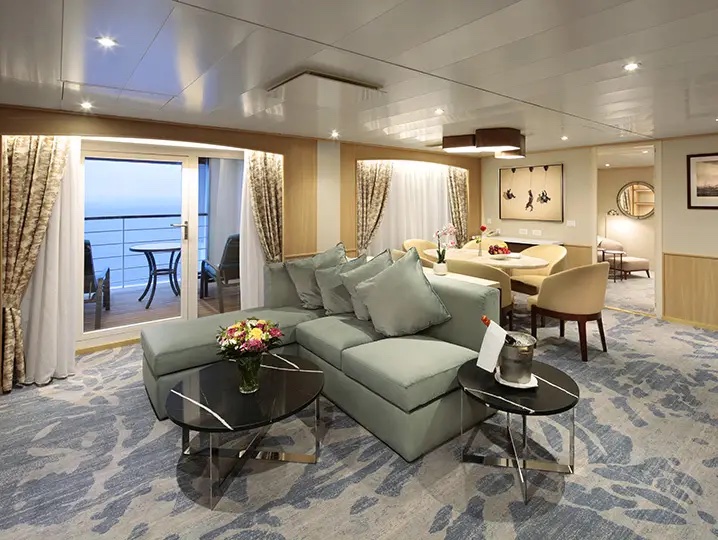
Owner's Suite Midship
A stunning brand new owner’s suites with 820 square feet of space featuring two bedrooms and two bathrooms, a verandah, and plenty of space in the sitting area for entertaining. This is the most sought after suite on the entire ship and once you stay here, you’ll never stay anywhere else.
Newly Redesigned Restrooms
We reimagined our restrooms to provide you a private oasis within your own room.
Amenities
- Queen Size Bed with Luxurious Linens
- Waffle Weave Robe and Slippers
- Interactive TV
- Fully Stocked Mini Bar/Refrigerator
- Safe
- Direct Dial Phone
- L’Occitane Bath Amenities
- Fresh Fruit
- Hair Dryers and 110/220 outlets
- Wi-Fi Internet Access (various plans available for purchase)
- Mirrored closet with ample drawer space
- Granite vanity with magnifying mirror and chair
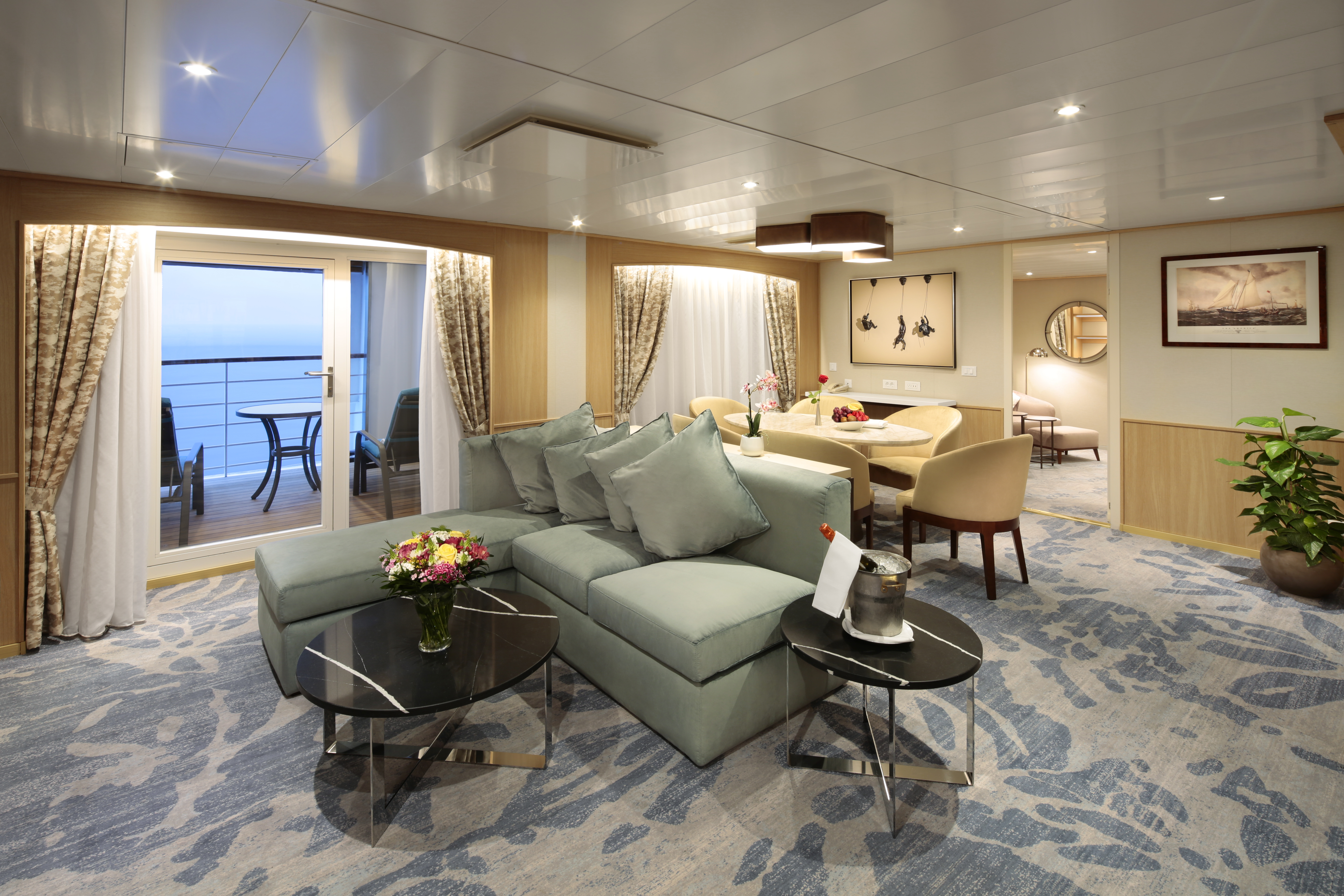
Owner's Suite Forward
With 575 square feet, your Owner’s Suite offers separate living room and dining areas. A veranda, Interactive TVs, and a full master bath and separate powder room indulge you in spacious comfort.
Newly Redesigned Restrooms
We reimagined our restrooms to provide you a private oasis within your own room.
Amenities
-
Queen Size Bed with Luxurious Linens
- Waffle Weave Robe and Slippers
- Interactive TV
- Fully Stocked Mini Bar/Refrigerator
- Safe
- Direct Dial Phone
- L’Occitane Bath Amenities
- Fresh Fruit
- Hair Dryers and 110/220 outlets
- Wi-Fi Internet Access(various plans available for purchase)
- Mirrored closet with ample drawer space
- Granite vanity with magnifying mirror and chair

Star Porthole Suite
These rooms represent a nod to the sailing tradition of porthole windows. And while sailors might have had cramped quarters, your 277 square foot stateroom is wonderfully spacious and furnished with all the modern amenities and comforts of home.
Newly Redesigned Restrooms
We reimagined our restrooms to provide you a private oasis within your own room.
Amenities
- Queen Size Bed with Luxurious Linens
- Waffle Weave Robe and Slippers
- Interactive TV
- Fully Stocked Mini Bar/Refrigerator
- Safe
- Direct Dial Phone
- L’Occitane Bath Amenities
- Fresh Fruit
- Hair Dryers and 110/220 outlets
- Wi-Fi Internet Access(various plans available for purchase)
- Mirrored closet with ample drawer space
- Granite vanity with magnifying mirror and chair
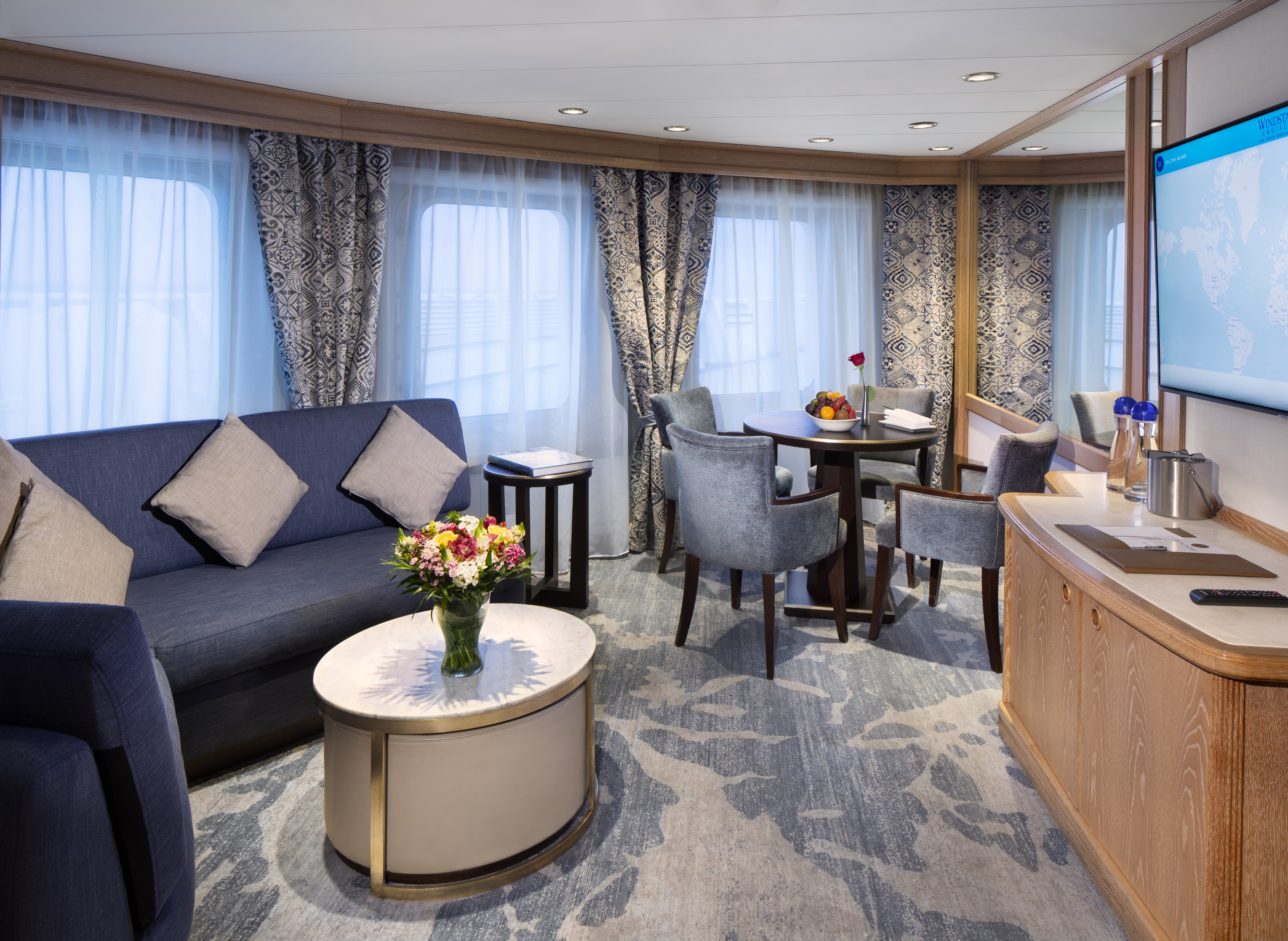
Classic Suite
Relax in 400 to 530 spacious square feet. Your living area offers beautiful views from the forward-facing window and French doors onto your private veranda. Two spacious closets give you plenty of room to unpack.
Newly Redesigned Restrooms
We reimagined our restrooms to provide you a private oasis within your own room.
Amenities
- Queen Size Bed with Luxurious Linens
- Waffle Weave Robe and Slippers
- Interactive TV
- Fully Stocked Mini Bar/Refrigerator
- Safe
- Direct Dial Phone
- L’Occitane Bath Amenities
- Fresh Fruit
- Hair Dryers and 110/220 outlets
- Wi-Fi Internet Access(various plans available for purchase)
- Mirrored closet with ample drawer space
- Granite vanity with magnifying mirror and chair
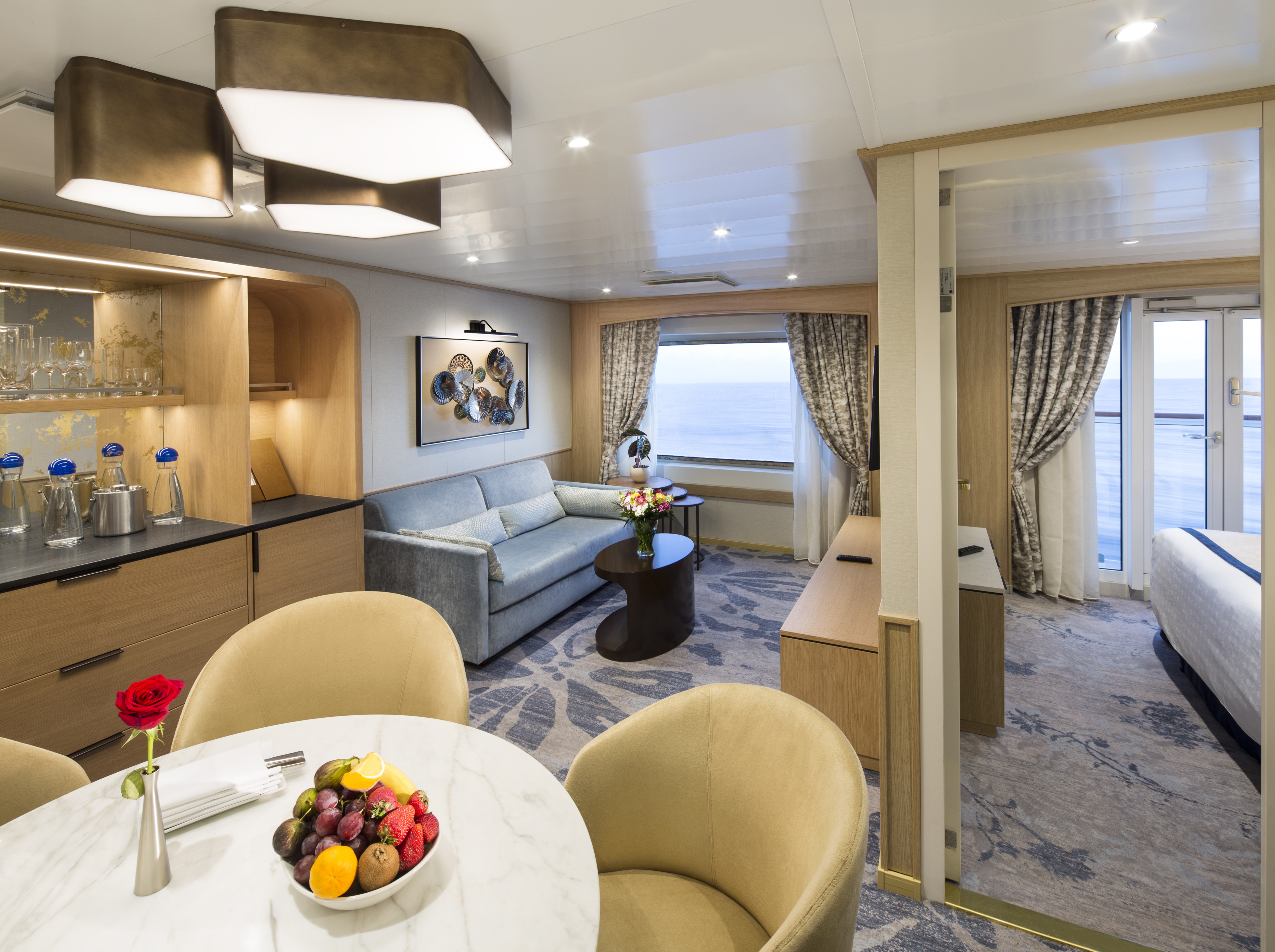
Deluxe Suite
Brand new Deluxe Suites welcome you with 468 square feet of casually elegant living space and an ocean viewing French balcony. All these suites feature 3rd berths, and a sleep-inducing queen bed easily converted to twins.
Newly Redesigned Restrooms
We reimagined our restrooms to provide you a private oasis within your own room.
Amenities
- Queen Size Bed with Luxurious Linens
- Waffle Weave Robe and Slippers
- Interactive TV
- Fully Stocked Mini Bar/Refrigerator
- Safe
- Direct Dial Phone
- L’Occitane Bath Amenities
- Fresh Fruit
- Hair Dryers and 110/220 outlets
- Wi-Fi Internet Access(various plans available for purchase)
- Mirrored closet with ample drawer space
- Granite vanity with magnifying mirror and chair
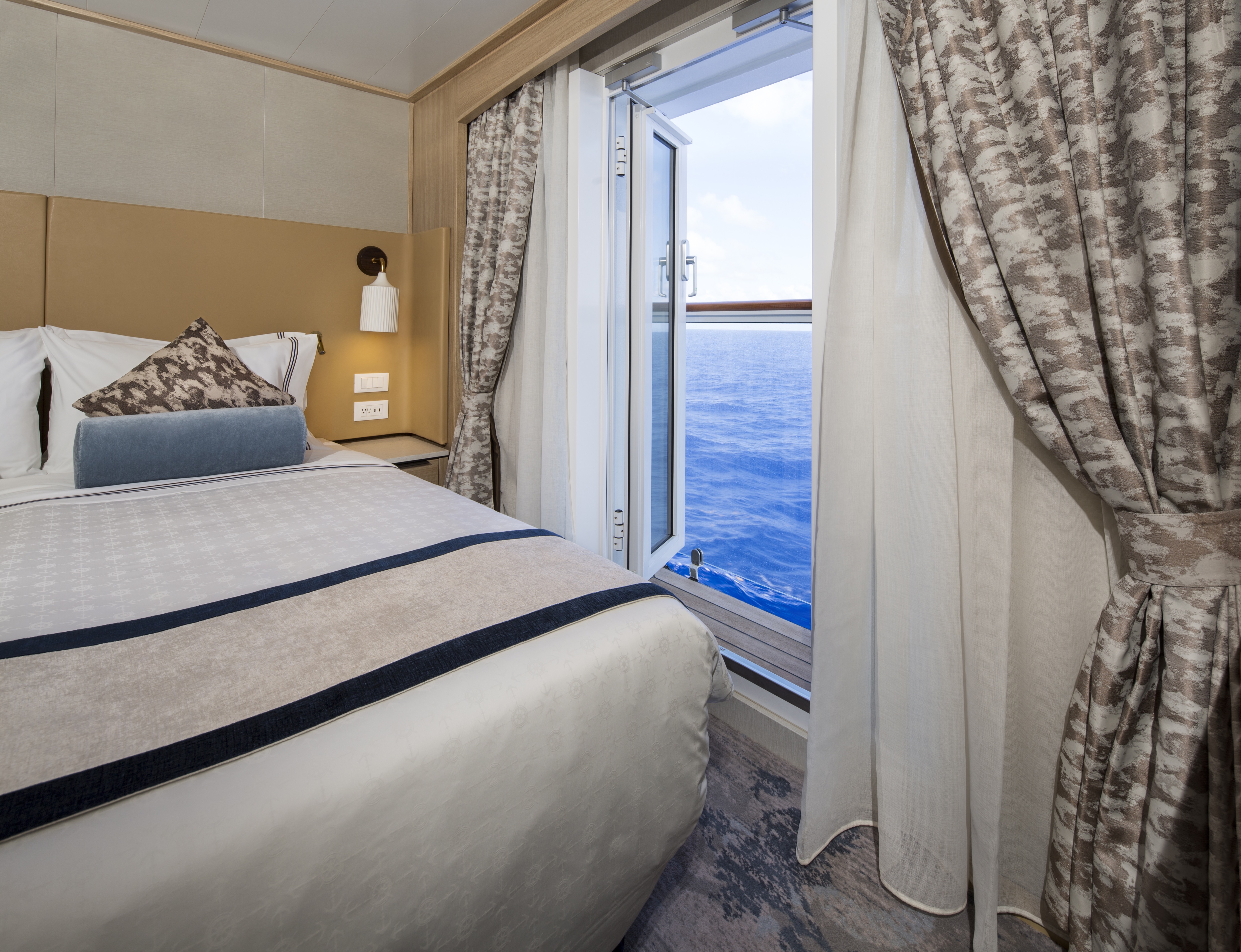
Star Balcony Suite
As soon as you walk through the door, you’re greeted with an open living area for a more welcoming entrance. Drift off to sleep by the window in your queen bed as you watch the same stars that sailors used to navigate the seas hundreds of years ago.
Newly Redesigned Restrooms
We reimagined our restrooms to provide you a private oasis within your own room.
Amenities
- Queen Size Bed with Luxurious Linens
- Waffle Weave Robe and Slippers
- Interactive TV
- Fully Stocked Mini Bar/Refrigerator
- Safe
- Direct Dial Phone
- L’Occitane Bath Amenities
- Fresh Fruit
- Hair Dryers and 110/220 outlets
- Wi-Fi Internet Access(various plans available for purchase)
- Mirrored closet with ample drawer space
- Granite vanity with magnifying mirror and chair
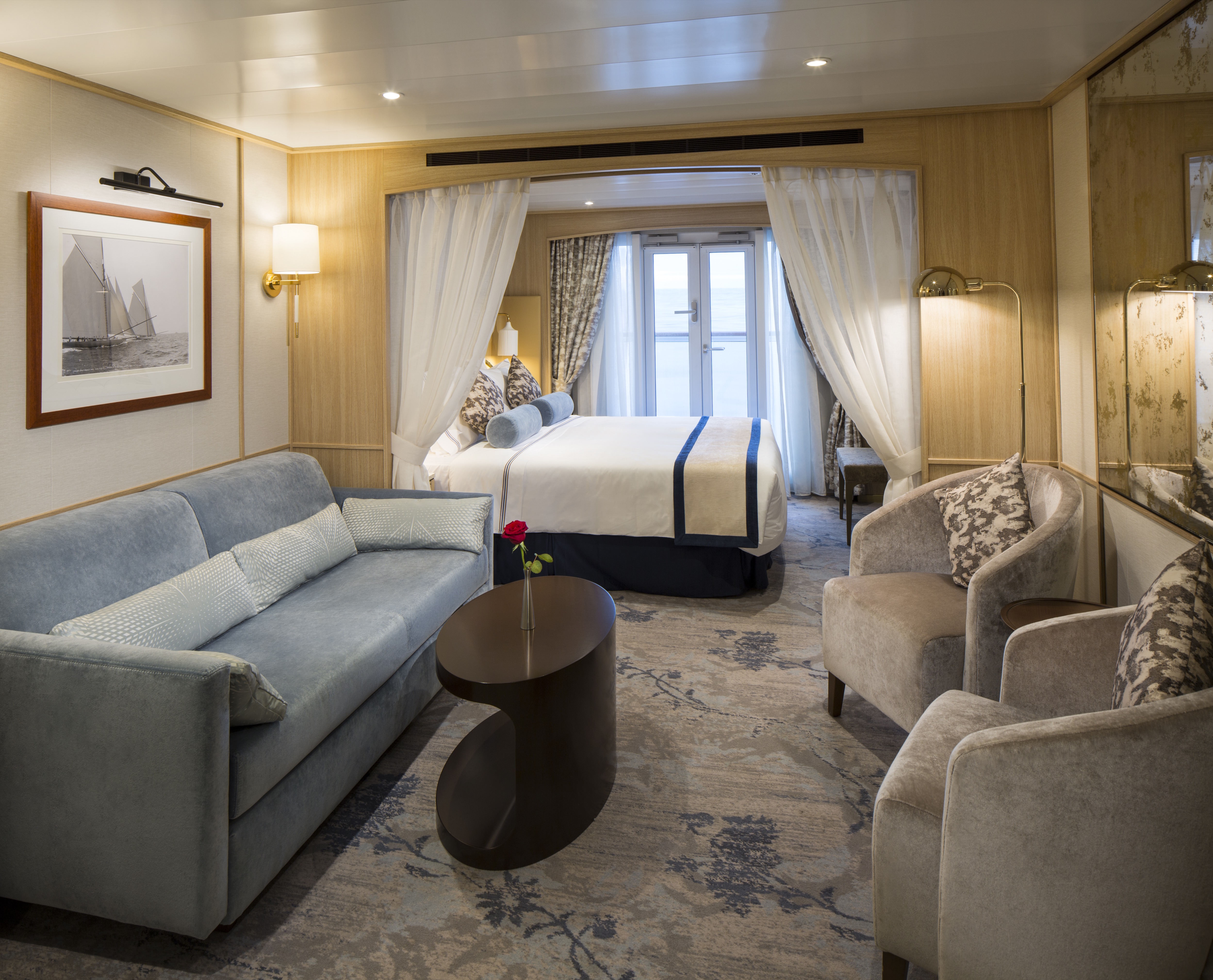
Star Balcony Suite 1
As soon as you walk through the door, you’re greeted with an open living area for a more welcoming entrance. Drift off to sleep by the window in your queen bed as you watch the same stars that sailors used to navigate the seas hundreds of years ago.
Newly Redesigned Restrooms
We reimagined our restrooms to provide you a private oasis within your own room.
Amenities
- Queen Size Bed with Luxurious Linens
- Waffle Weave Robe and Slippers
- Interactive TV
- Fully Stocked Mini Bar/Refrigerator
- Safe
- Direct Dial Phone
- L’Occitane Bath Amenities
- Fresh Fruit
- Hair Dryers and 110/220 outlets
- Wi-Fi Internet Access(various plans available for purchase)
- Mirrored closet with ample drawer space
- Granite vanity with magnifying mirror and chair

Balcony Suite
Stylish comfort and ocean views welcome you in 277 square feet. Your queen bed (which can be separated as twins if you prefer) features luxurious Egyptian cotton linens. Enjoy a luxurious soak in your full-size tub or an invigorating shower, then wrap up in your waffle-weave robe and slippers, savour a treat from the fresh fruit bowl, or simply stretch out and enjoy the fresh flowers.
Newly Redesigned Restrooms
We reimagined our restrooms to provide you a private oasis within your own room.
Amenities
- Queen Size Bed with Luxurious Linens
- Waffle Weave Robe and Slippers
- Interactive TV
- Fully Stocked Mini Bar/Refrigerator
- Safe
- Direct Dial Phone
- L’Occitane Bath Amenities
- Fresh Fruit
- Hair Dryers and 110/220 outlets
- Wi-Fi Internet Access (various plans available for purchase)
- Mirrored closet with ample drawer space
- Granite vanity with magnifying mirror and chair

Balcony Suite 1
Stylish comfort and ocean views welcome you in 277 square feet. Your queen bed (which can be separated as twins if you prefer) features luxurious Egyptian cotton linens. Enjoy a luxurious soak in your full-size tub or an invigorating shower, then wrap up in your waffle-weave robe and slippers, savour a treat from the fresh fruit bowl, or simply stretch out and enjoy the fresh flowers.
Newly Redesigned Restrooms
We reimagined our restrooms to provide you a private oasis within your own room.
Amenities
- Queen Size Bed with Luxurious Linens
- Waffle Weave Robe and Slippers
- Interactive TV
- Fully Stocked Mini Bar/Refrigerator
- Safe
- Direct Dial Phone
- L’Occitane Bath Amenities
- Fresh Fruit
- Hair Dryers and 110/220 outlets
- Wi-Fi Internet Access (various plans available for purchase)
- Mirrored closet with ample drawer space
- Granite vanity with magnifying mirror and chair
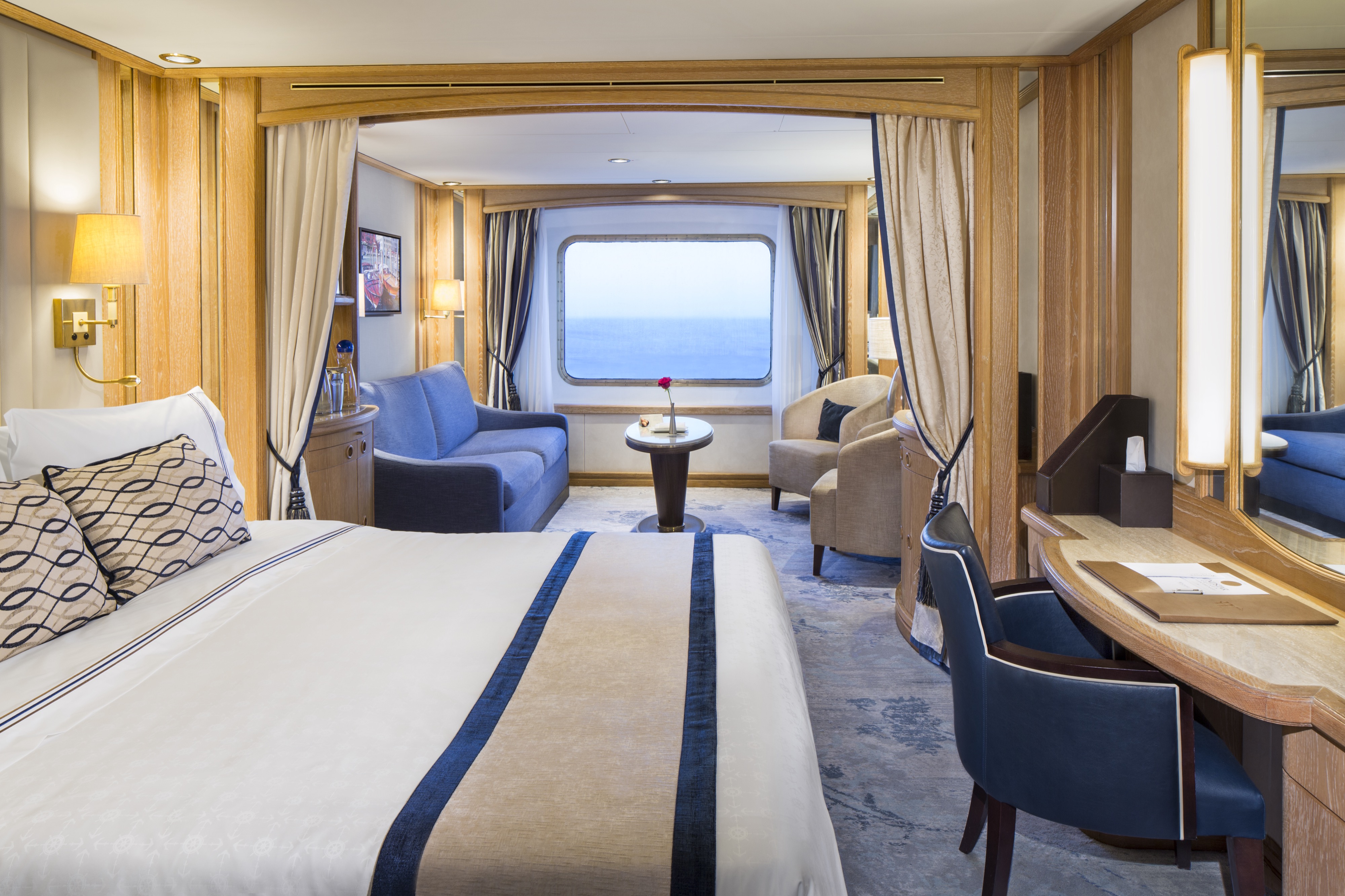
Star Ocean View Suite 1
As soon as you walk through the door, you’re greeted with an open living area for a more welcoming entrance. Drift off to sleep by the window in your queen bed as you watch the same stars that sailors used to navigate the seas hundreds of years ago.
Newly Redesigned Restrooms
We reimagined our restrooms to provide you a private oasis within your own room.
Amenities
- Queen Size Bed with Luxurious Linens
- Waffle Weave Robe and Slippers
- Interactive TV
- Fully Stocked Mini Bar/Refrigerator
- Safe
- Direct Dial Phone
- L’Occitane Bath Amenities
- Fresh Fruit
- Hair Dryers and 110/220 outlets
- Wi-Fi Internet Access (various plans available for purchase)
- Mirrored closet with ample drawer space
- Granite vanity with magnifying mirror and chair

Ocean View Suite
Stylish comfort and ocean views welcome you in 277 square feet. Your queen bed (which can be separated as twins if you prefer) features luxurious Egyptian cotton linens. Enjoy a luxurious soak in your full-size tub or an invigorating shower, then wrap up in your waffle-weave robe and slippers, savor a treat from the fresh fruit bowl, or simply stretch out and enjoy the fresh flowers.
Newly Redesigned Restrooms
We reimagined our restrooms to provide you a private oasis within your own room.
Amenities
- Queen Size Bed with Luxurious Linens
- Waffle Weave Robe and Slippers
- Interactive TV
- Fully Stocked Mini Bar/Refrigerator
- Safe
- Direct Dial Phone
- L’Occitane Bath Amenities
- Fresh Fruit
- Hair Dryers and 110/220 outlets
- Wi-Fi Internet Access (various plans available for purchase)
- Mirrored closet with ample drawer space
- Granite vanity with magnifying mirror and chair

Ocean View Suite 1
Stylish comfort and ocean views welcome you in 277 square feet. Your queen bed (which can be separated as twins if you prefer) features luxurious Egyptian cotton linens. Enjoy a luxurious soak in your full-size tub or an invigorating shower, then wrap up in your waffle-weave robe and slippers, savour a treat from the fresh fruit bowl, or simply stretch out and enjoy the fresh flowers.
Newly Redesigned Restrooms
We reimagined our restrooms to provide you a private oasis within your own room.
Amenities
- Queen Size Bed with Luxurious Linens
- Waffle Weave Robe and Slippers
- Interactive TV
- Fully Stocked Mini Bar/Refrigerator
- Safe
- Direct Dial Phone
- L’Occitane Bath Amenities
- Fresh Fruit
- Hair Dryers and 110/220 outlets
- Wi-Fi Internet Access (various plans available for purchase)
- Mirrored closet with ample drawer space
- Granite vanity with magnifying mirror and chair

Ocean View Suite 2
Stylish comfort and ocean views welcome you in 277 square feet. Your queen bed (which can be separated as twins if you prefer) features luxurious Egyptian cotton linens. Enjoy a luxurious soak in your full-size tub or an invigorating shower, then wrap up in your waffle-weave robe and slippers, savour a treat from the fresh fruit bowl, or simply stretch out and enjoy the fresh flowers.
Newly Redesigned Restrooms
We reimagined our restrooms to provide you a private oasis within your own room.
Amenities
- Queen Size Bed with Luxurious Linens
- Waffle Weave Robe and Slippers
- Interactive TV
- Fully Stocked Mini Bar/Refrigerator
- Safe
- Direct Dial Phone
- L’Occitane Bath Amenities
- Fresh Fruit
- Hair Dryers and 110/220 outlets
- Wi-Fi Internet Access (various plans available for purchase)
- Mirrored closet with ample drawer space
- Granite vanity with magnifying mirror and chair

Ocean View Suite 3
Stylish comfort and ocean views welcome you in 277 square feet. Your queen bed (which can be separated as twins if you prefer) features luxurious Egyptian cotton linens. Enjoy a luxurious soak in your full-size tub or an invigorating shower, then wrap up in your waffle-weave robe and slippers, savor a treat from the fresh fruit bowl, or simply stretch out and enjoy the fresh flowers.
Newly Redesigned Restrooms
We reimagined our restrooms to provide you a private oasis within your own room.
Amenities
- Queen Size Bed with Luxurious Linens
- Waffle Weave Robe and Slippers
- Interactive TV
- Fully Stocked Mini Bar/Refrigerator
- Safe
- Direct Dial Phone
- L’Occitane Bath Amenities
- Fresh Fruit
- Hair Dryers and 110/220 outlets
- Wi-Fi Internet Access (various plans available for purchase)
- Mirrored closet with ample drawer space
- Granite vanity with magnifying mirror and chair
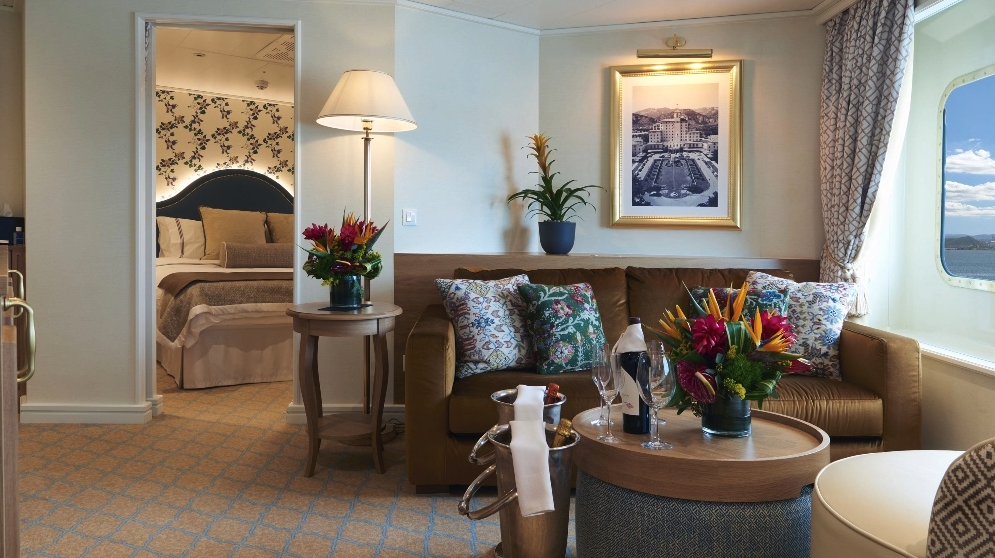
Broadmoor Suite
Inspired by the design of The Broadmoor, the suite offers a traditional space with classic furniture, floral motifs, white trim with gold finishes, and wide crown moulding. New furnishings, and wall sconces have been specially commissioned in the resort’s style. The striking wallpaper used in the suite’s walk-in closet is an exact replica of the wallpaper used throughout The Broadmoor. The resort’s signature carpeting, with shades of light blue, brown, yellow and gold, was also recreated for the space. Historical black and white images of The Broadmoor will be on display.
Newly Redesigned Restrooms
We reimagined our restrooms to provide you a private oasis within your own room.
Amenities
- Queen Size Bed with Luxurious Linens
- Waffle Weave Robe and Slippers
- Interactive TV
- Fully Stocked Mini Bar/Refrigerator
- Safe
- Direct Dial Phone
- L’Occitane Bath Amenities
- Fresh Fruit
- Hair Dryers and 110/220 outlets
- Wi-Fi Internet Access (various plans available for purchase)
- Mirrored closet with ample drawer space
- Granite vanity with magnifying mirror and chair
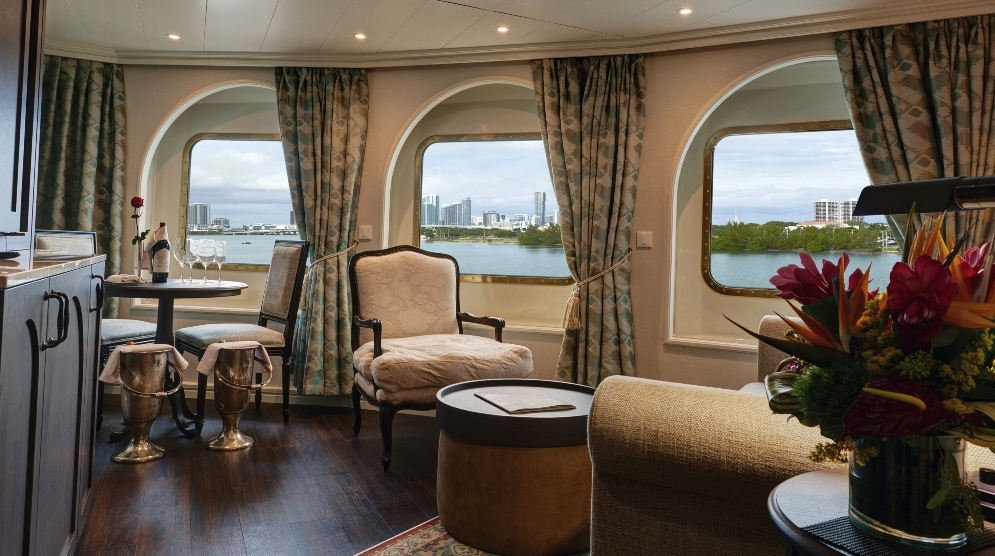
Sea Island Suite
This suite will offer a coastal airy space with curved arches, lovely “hardwood” floors, gorgeous inset carpeting, light walls, and white trim with black finishes. New antique-style furnishings and custom wallpapers have been specially commissioned in the resort’s style. You’ll never see a TV at Sea Island (they are all tucked away in cabinets), so you won’t see one in this suite, either. Historical black and white images of Sea Island will be on display.
Newly Redesigned Restrooms
We reimagined our restrooms to provide you a private oasis within your own room.
Amenities
- Queen Size Bed with Luxurious Linens
- Waffle Weave Robe and Slippers
- Interactive TV
- Fully Stocked Mini Bar/Refrigerator
- Safe
- Direct Dial Phone
- L’Occitane Bath Amenities
- Fresh Fruit
- Hair Dryers and 110/220 outlets
- Wi-Fi Internet Access (various plans available for purchase)
- Mirrored closet with ample drawer space
- Granite vanity with magnifying mirror and chair
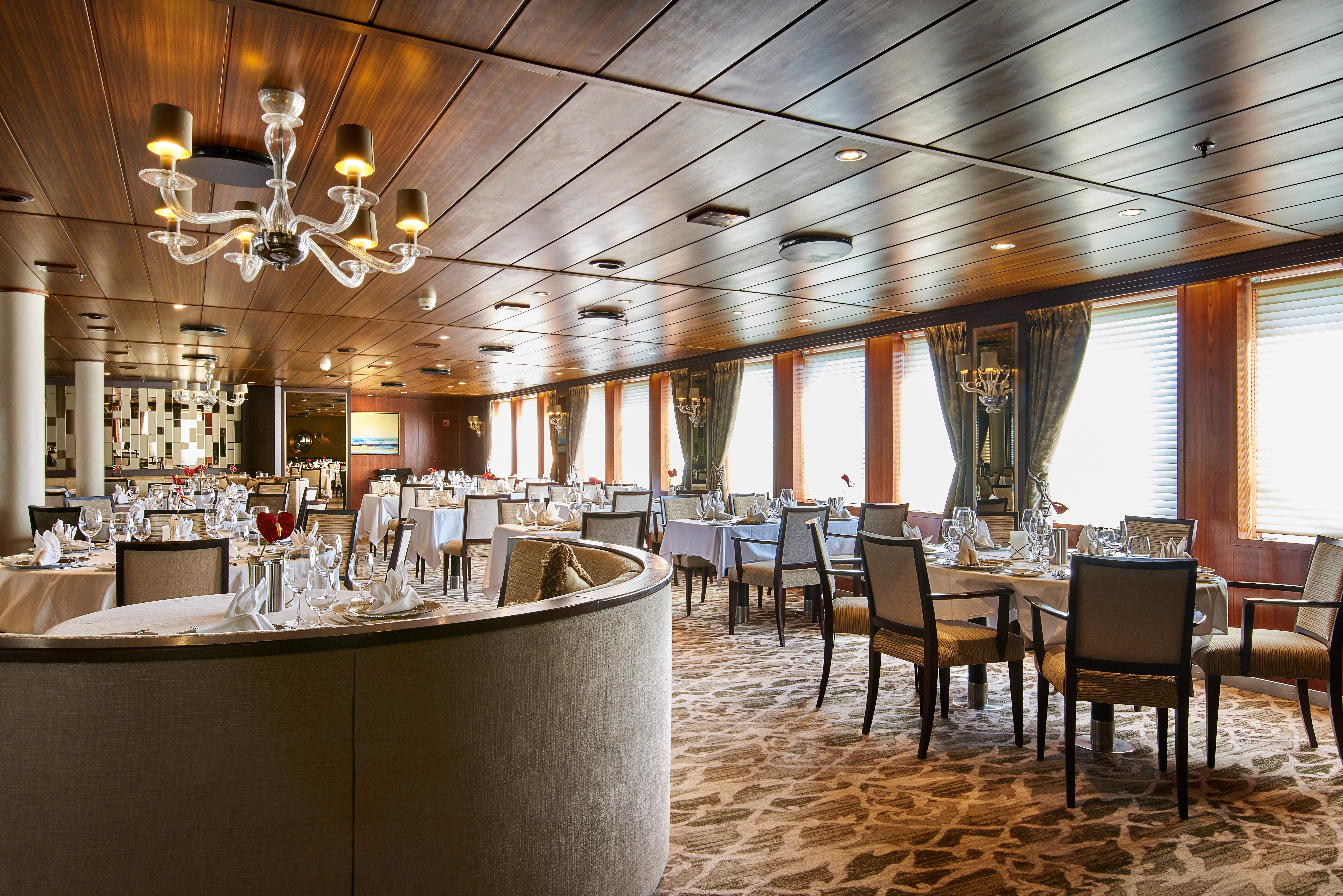
Amphora Restaurant
Here, the dining room manager seats you, but where is your decision. There are no pre-assigned tables or first or second seatings. When you dine and with whom are entirely up to you. Seating usually begins at 6:30 p.m. and will be printed in the ship’s daily program. Each delightful dish is prepared exactly to your liking – an exquisite dinner served course-by-course with a fine selection of vintage wines.
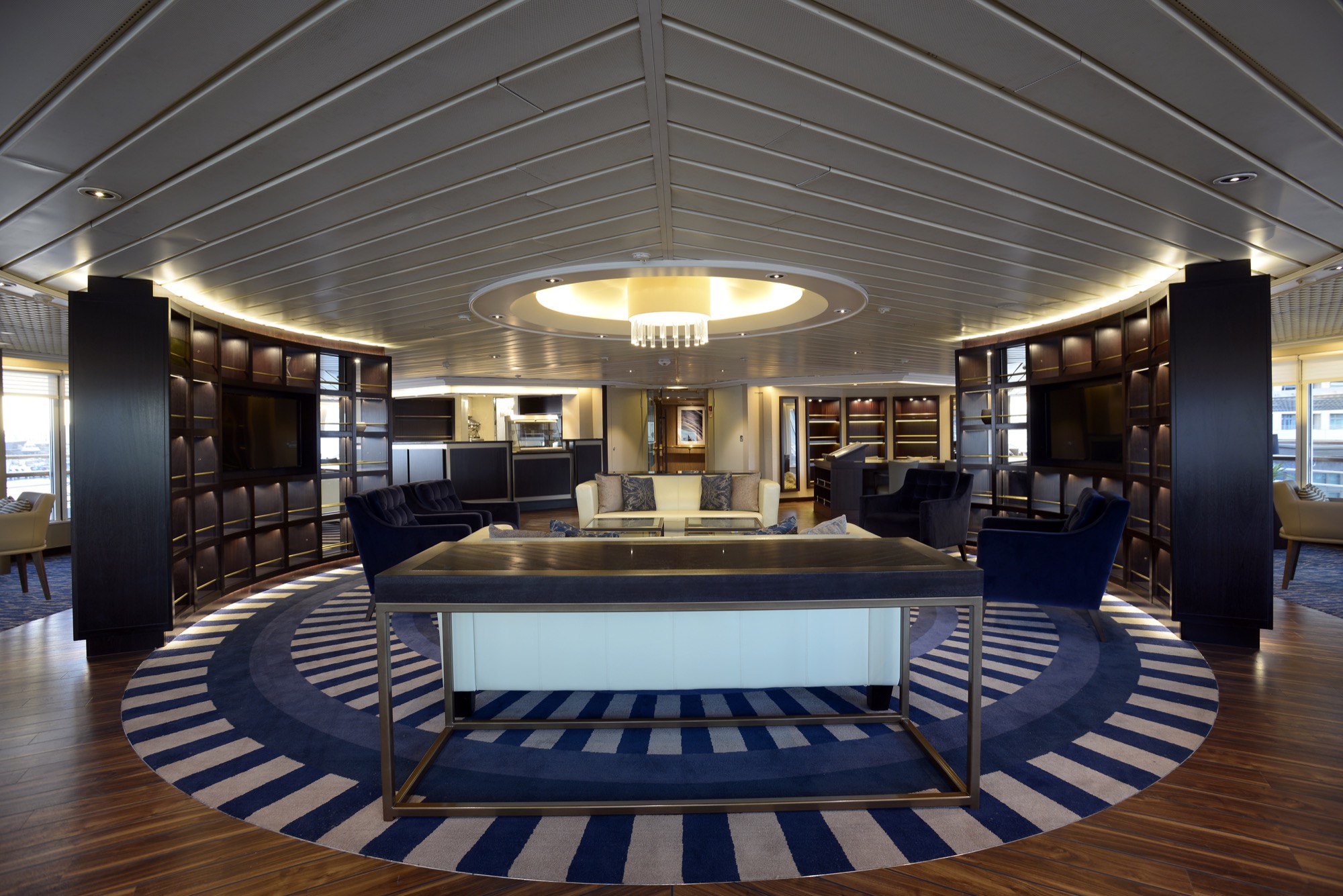
The Yacht Club
Certainly a Windstar favourite, The Yacht Club is the perfect place if you want to enjoy some casual dining. Serving gourmet sandwiches, snacks and beverages, all the food is prepared to your liking and is presented in impeccable Windstar style.
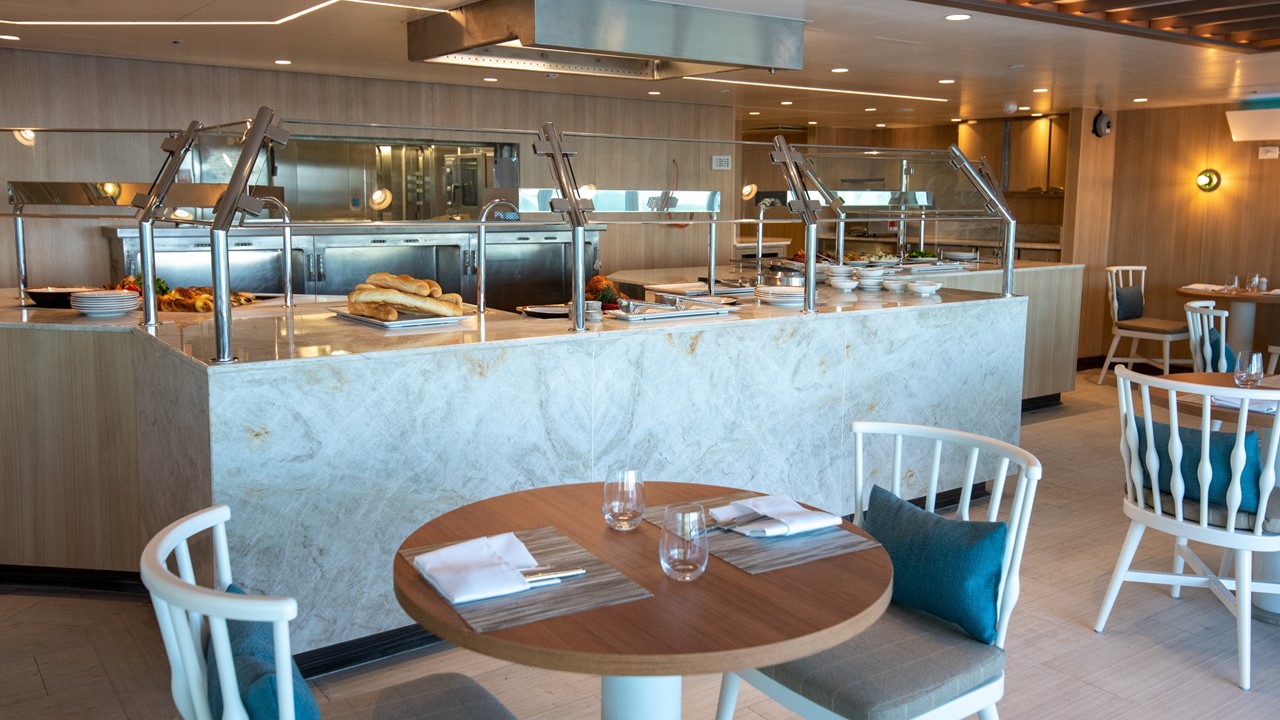
Veranda
It’s breakfast alfresco, full service or buffet-style, anytime till 9:30 a.m. No need to hurry. Again, the choices are many in Veranda. Choose the sumptuous, seemingly endless buffet. Or, order from the lunch menu between noon and 2:30 p.m.
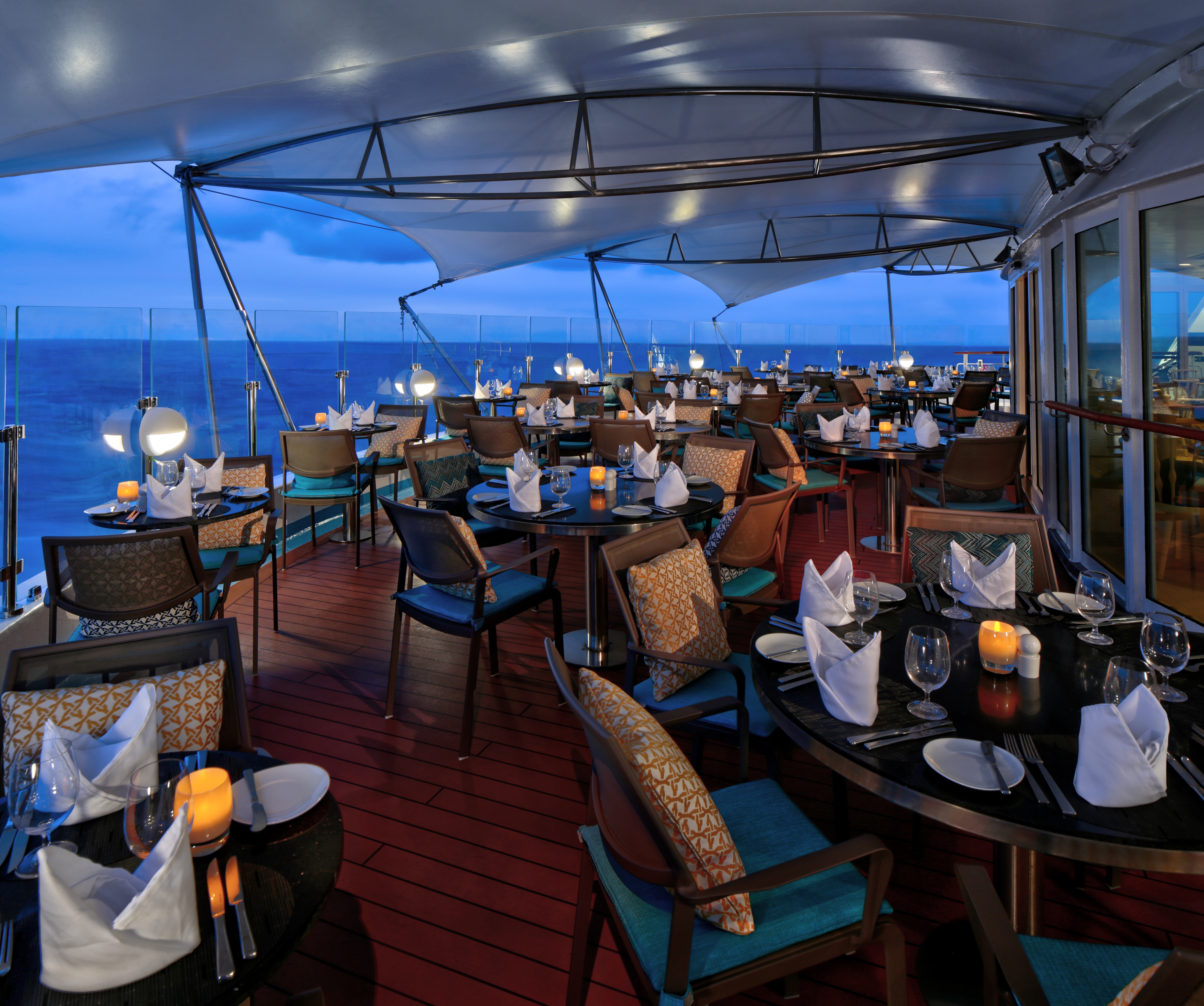
Candles Restaurant
Here’s the perfect place for a romantic tête-a-tête under the stars in Candles, Windstar’s signature outdoor restaurant transformed by night into a dreamlike paradise. Delectable cuisine, memorable surroundings, inspired wine pairings.
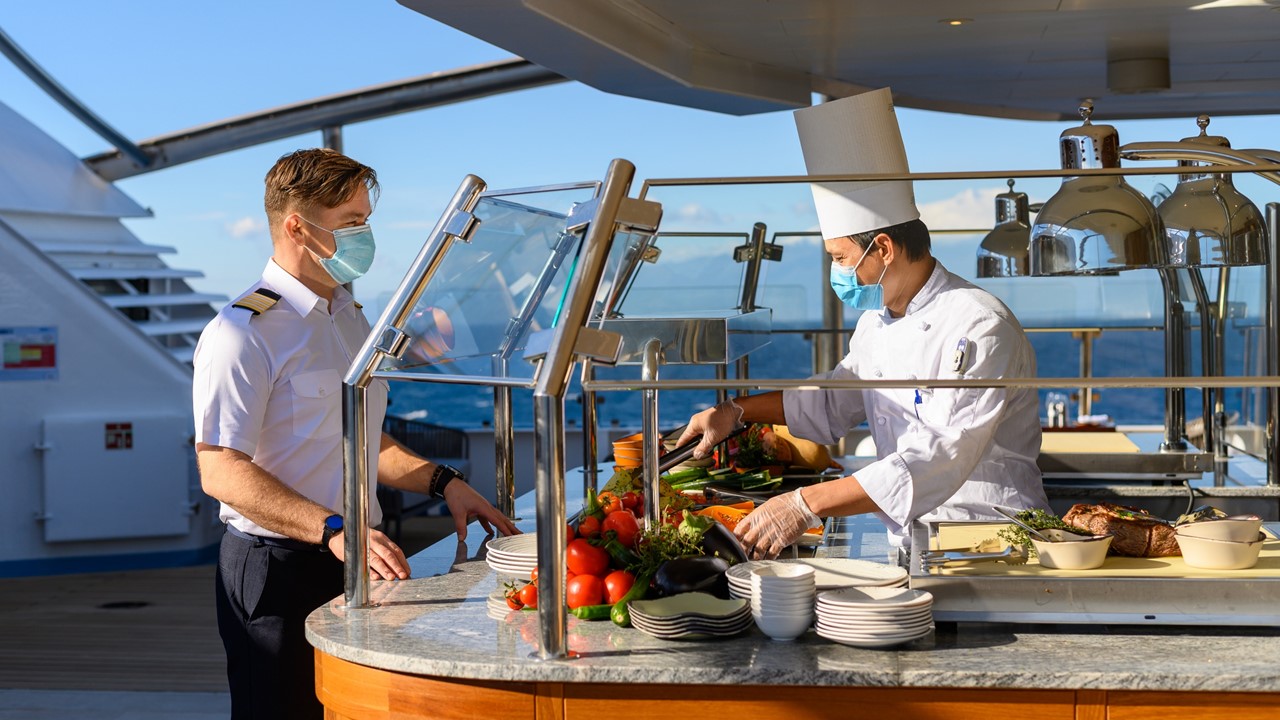
Star Grill by Steven Raichlen
You’ll find all your traditional grilled and barbecued favourites (and discover new dishes from around the world) in our new casual outdoor restaurant brought to you in partnership with global grilling authority, Steven Raichlen.
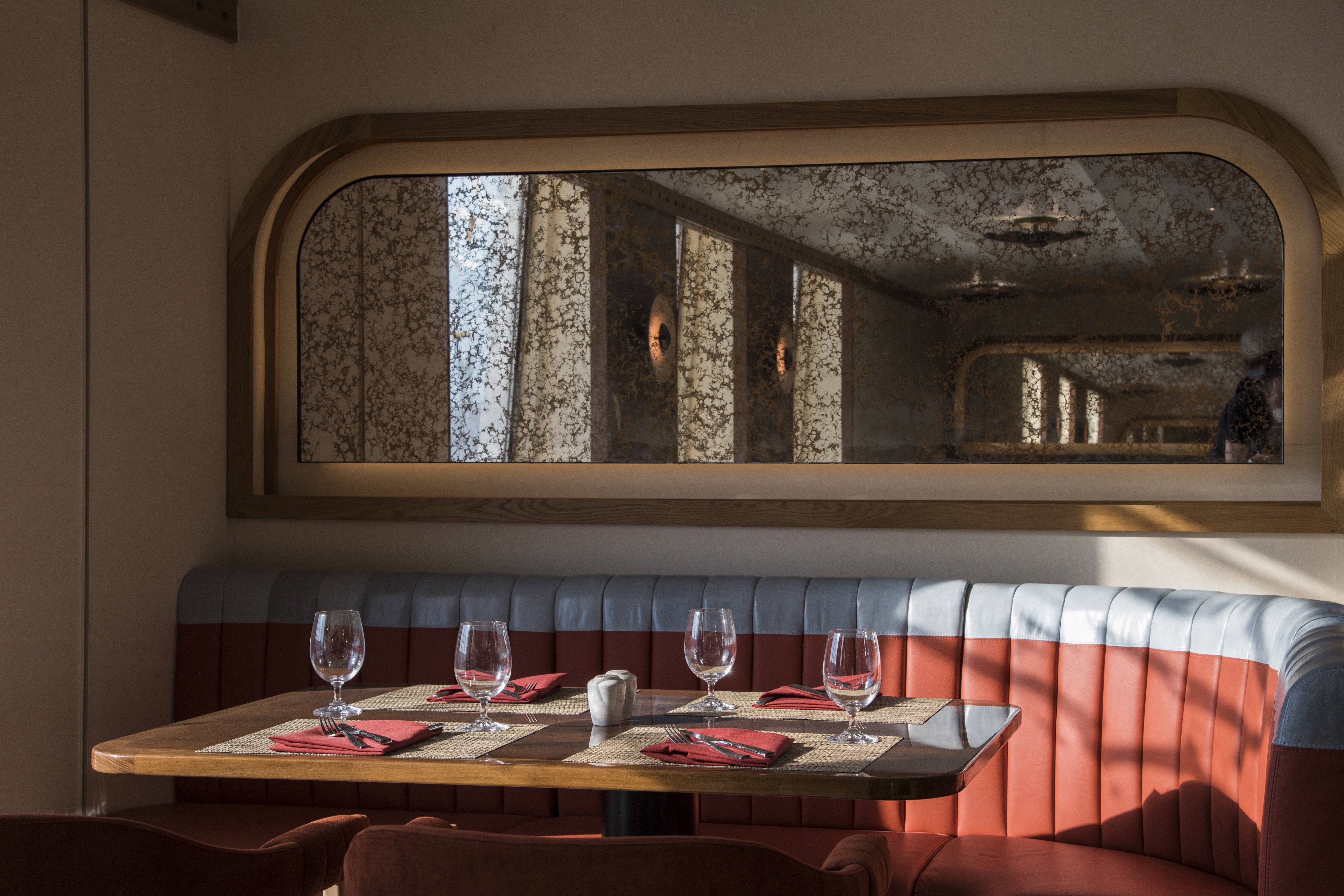
Cuadro 44 by Anthony Sasso
Savor flavors of Spanish local culture as you dine in intimate surroundings that encourage sharing and camaraderie by ten-time Michelin-starred Chef Anthony Sasso. With seating for 38 including a chef’s counter and communal table, it’s an inventive take on modern Spanish cuisine.
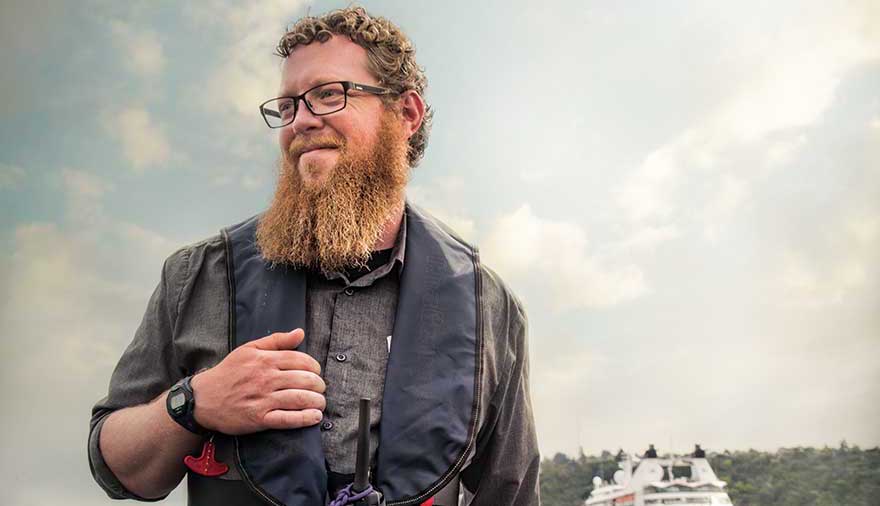
Guest Lecturers
Have you ever wanted to learn about rowing across the Atlantic or the inner workings of the Monte Carlo Grand Prix? On select Windstar voyages, satisfy your curiosity and enhance your understanding of the local culture by listening to our onboard lecturers. We’ve curated a group of speakers designed to bring you an insider’s perspective on a multitude of intriguing topics. Listen raptly as your voyage becomes more than just a vacation – and a thought-provoking exploration of enchanting lands.
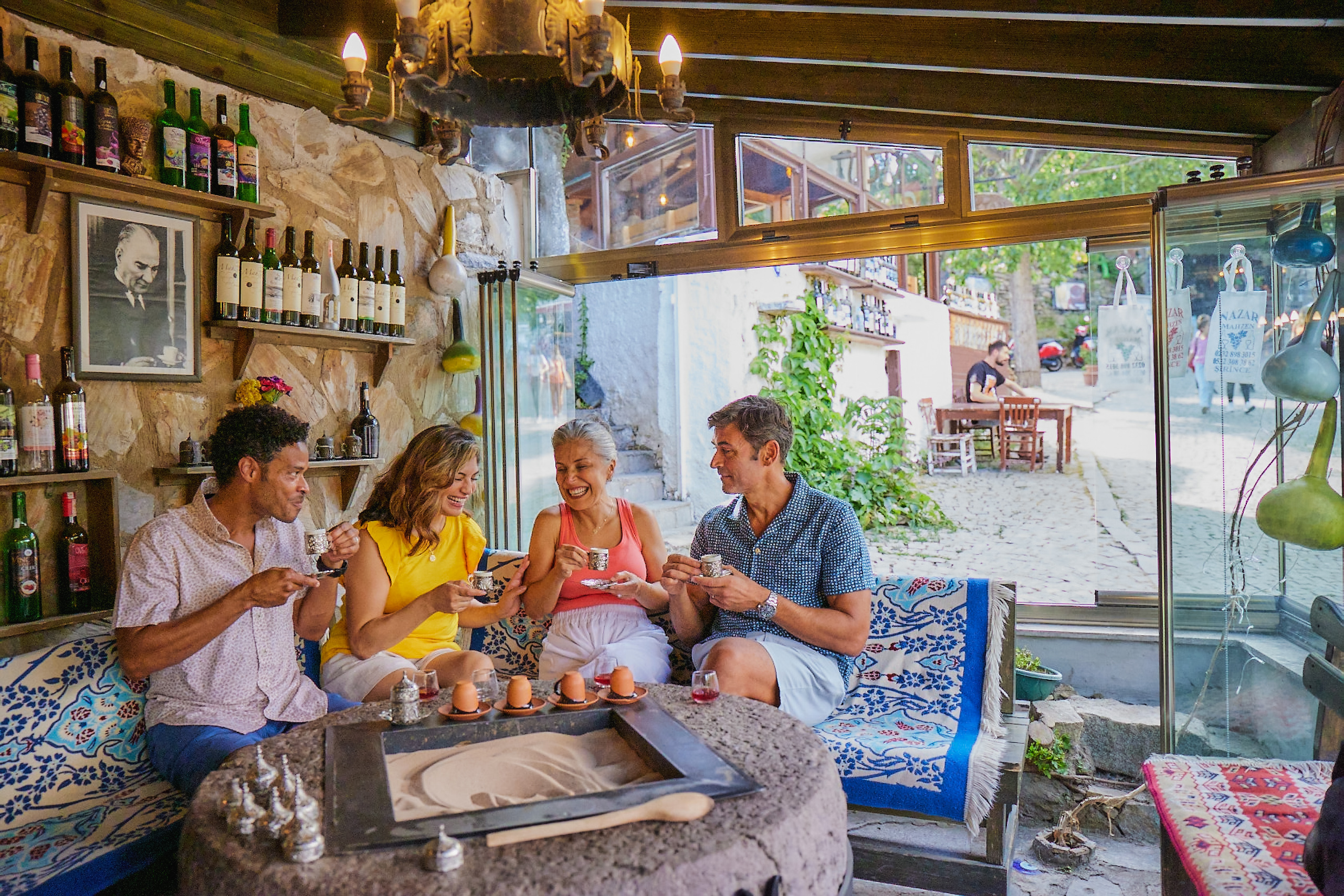
Windstar Signature Expeditions
Windstar Signature Expeditions is an immersive program that features 8 expert guides who stay on board throughout the voyage, giving informative talks and taking guests on optional adventures by foot, by kayak, or by Zodiac boat – sometimes launching straight from the ship in remote places like Misty Fjords and Kenai Fjords. It’s Alaska at its most authentic, exciting all your clients’ senses to its magnificence.
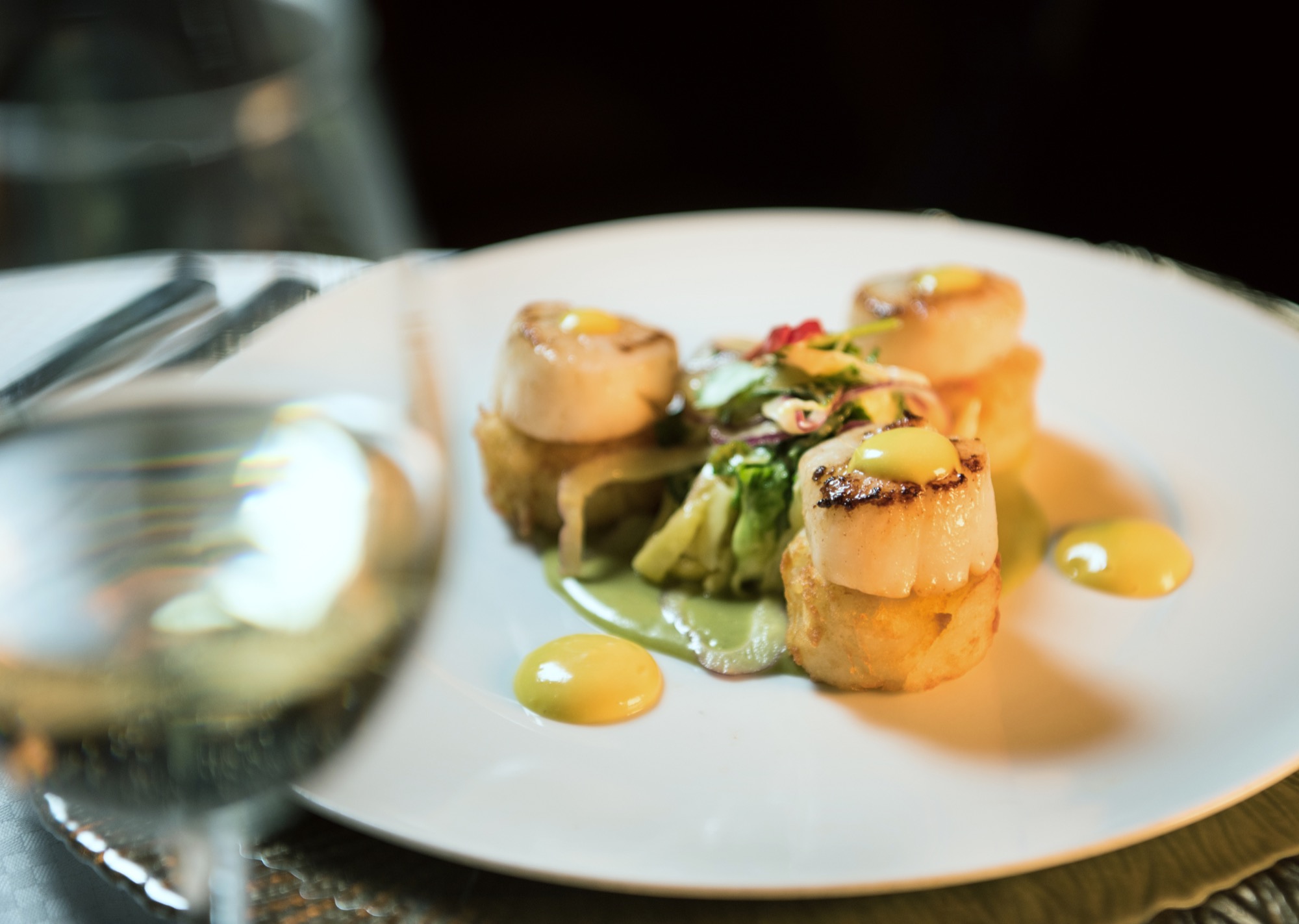
Culinary Demonstrations
Delight your palette with onboard cooking demonstrations featuring James Beard Foundation chef recipes. From wild striped bass with tomato sage “fondue” to lobster risotto, our Windstar chefs will take your taste buds on a journey through local cuisine. For a special tantalizing treat, join Windstar on one of our voyages in the James Beard Foundation Culinary Cruise Collection, where a James Beard Foundation chef will show you how to elevate your own culinary skills. It’s a taste of enrichment you’ll never forget.
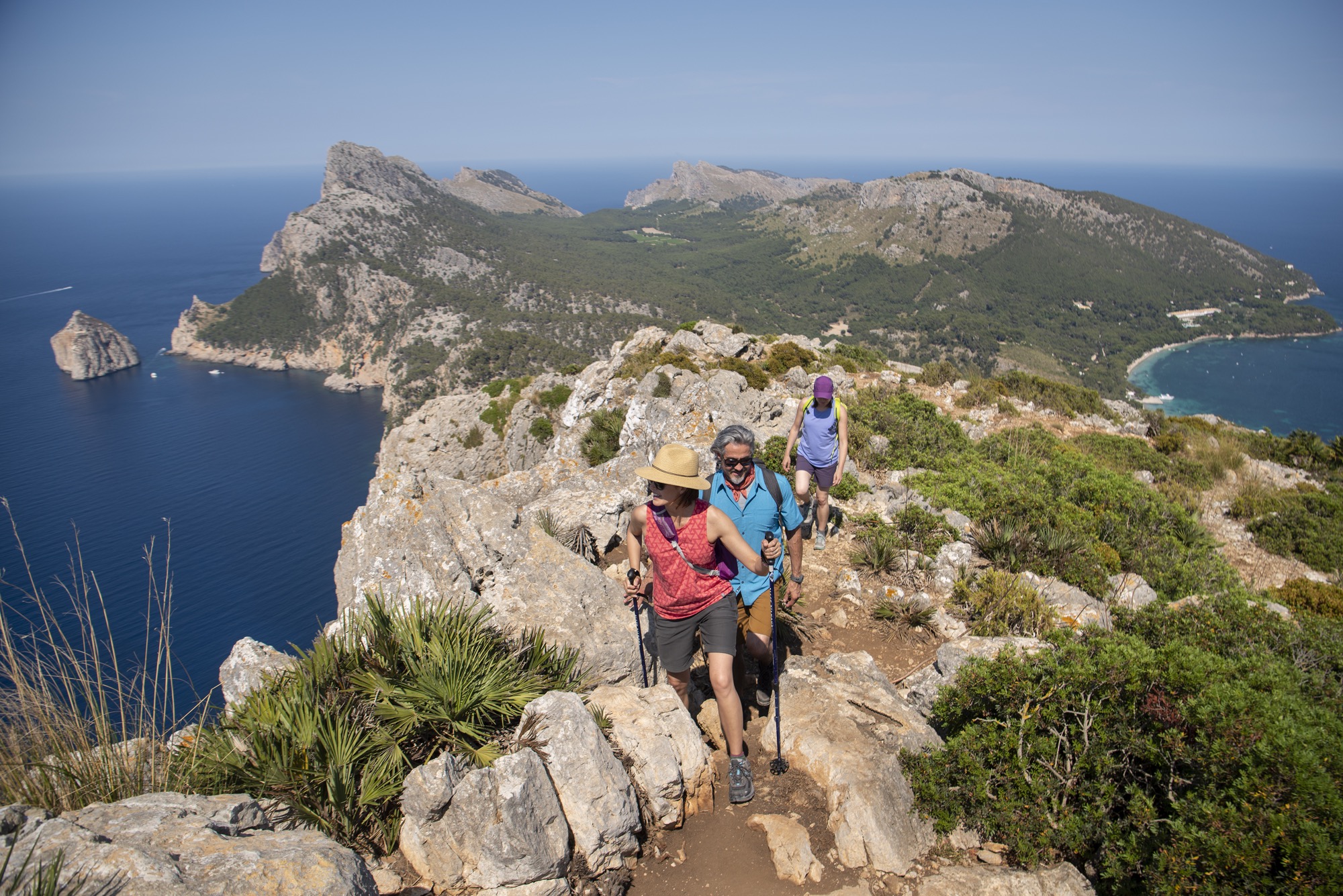
Shore Excursions
Wine tastings, SCUBA diving, tours with locals and more — Windstar offers a variety of unique excursions that will add more depth and immersion to every day of your journey. Each meticulously planned excursion meets our highest standard of quality in safety and professionalism. Ensure your peace of mind knowing that you’ll always make it back to the yacht on time.
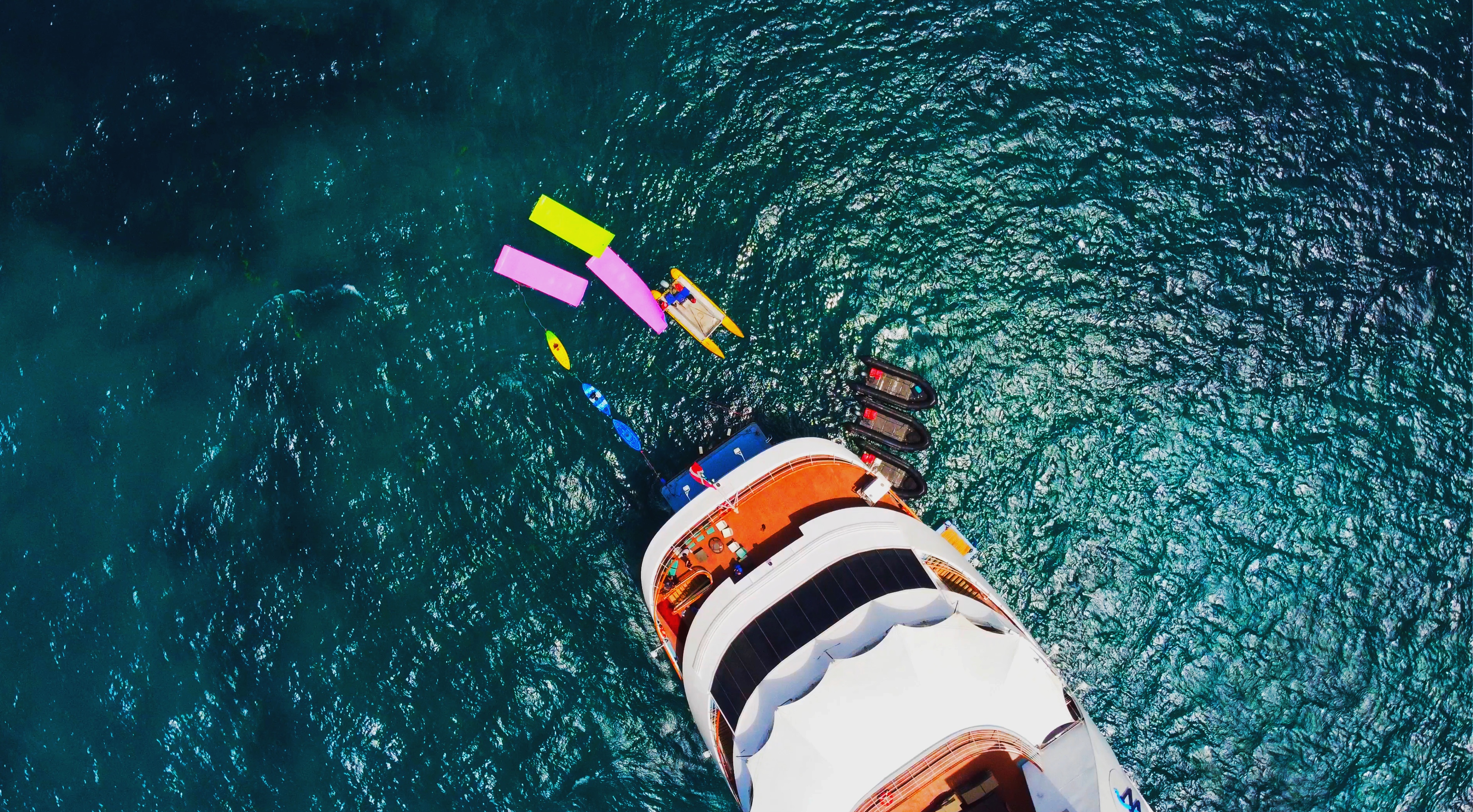
Watersports Platform
Sailings with Windstar include a lot of special amenities, but one of our most fun (and unique) is the Watersports Platform, which allows guests easy access to the ocean around them.
The platform exists on each of our six yachts and includes unlimited use of all water sports equipment including stand up paddle boarding, kayaking, snorkel equipment, sailing, swimming, water skiing, and windsurfing. If that all sounds like too much work for your vacation, a large foam flotation island is often unfurled into the sea, allowing guests to lounge, casually swim, and take in the view around them.
Use of the Platform is always weather permitting and only takes place in certain ports during each of our journeys in select regions. (check with the crew once on board for more details on where and when the platform will be open).
And don’t forget, there’s NO need to bring snorkel equipment on many Windstar cruises! We provide complimentary masks, fins, and snorkels during your first afternoon on board, so you can take that equipment with you when you’d like to go exploring on your own (or with a designated shore excursion). It even comes in a handy mesh bag. One less thing you have to pack when heading to paradise!
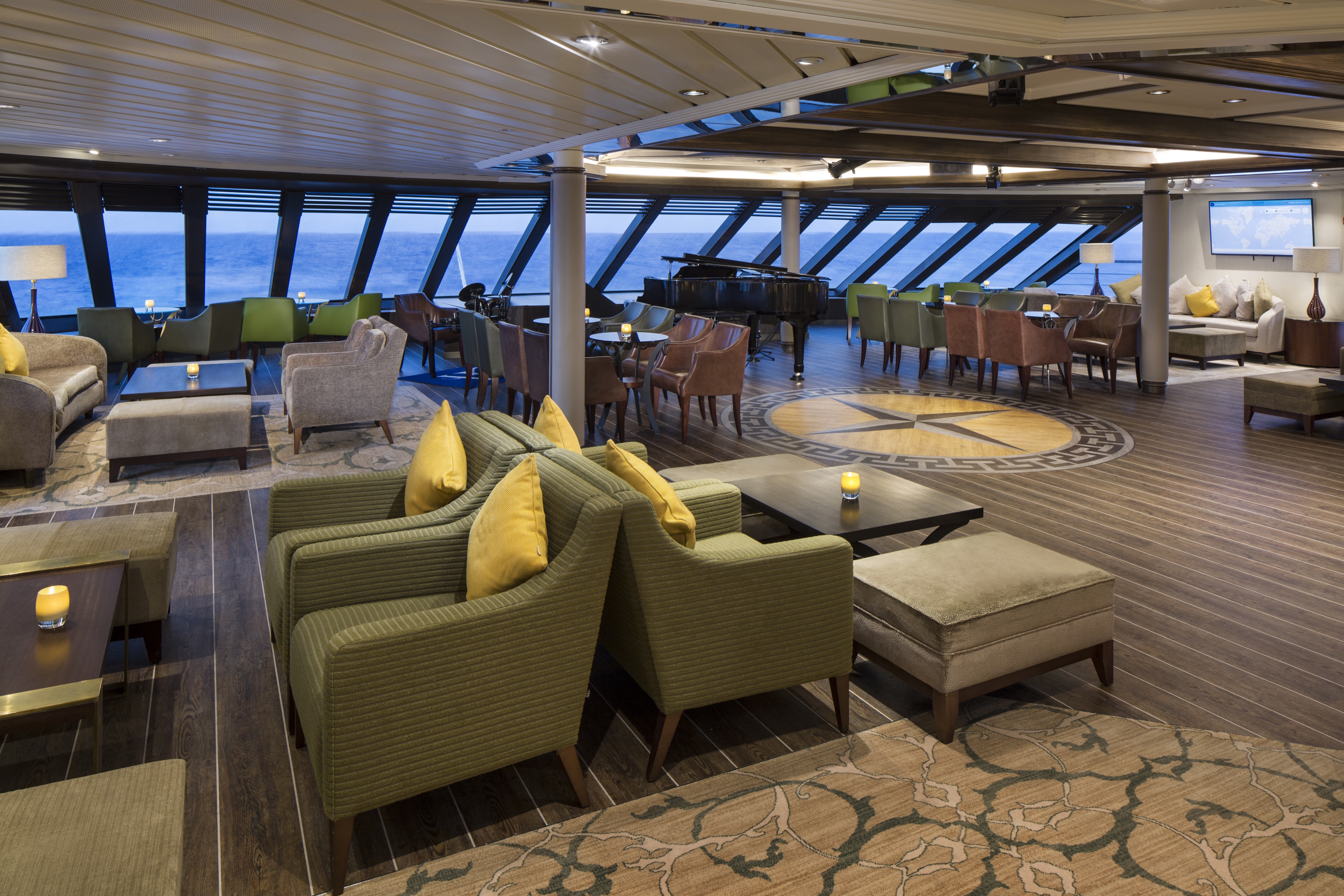
Compass Rose
Compass Rose can be found on Deck 6.
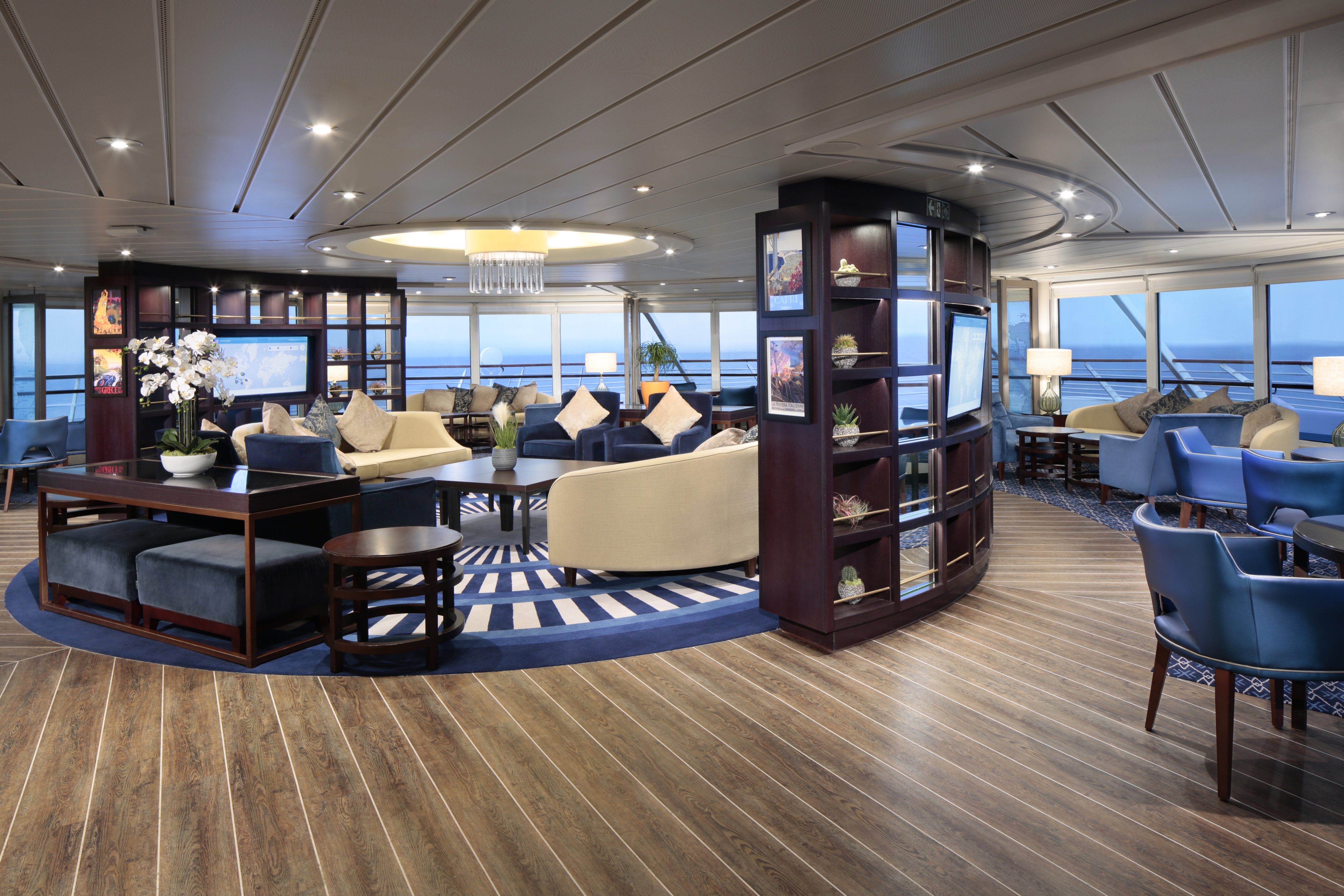
The Yacht Club
The Yacht Club can be found on Deck 8.
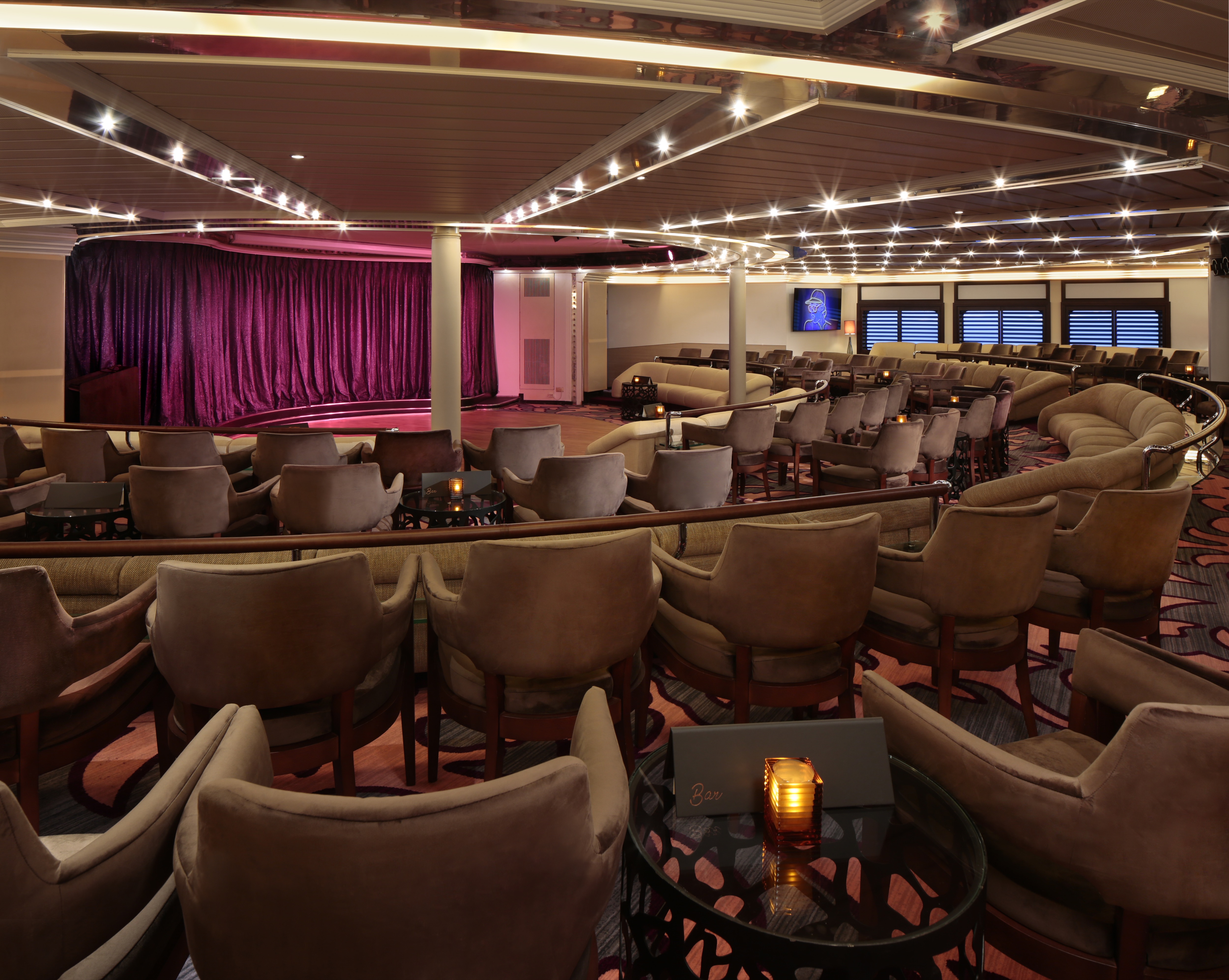
Lounge
The Lounge can be found on Deck 5.
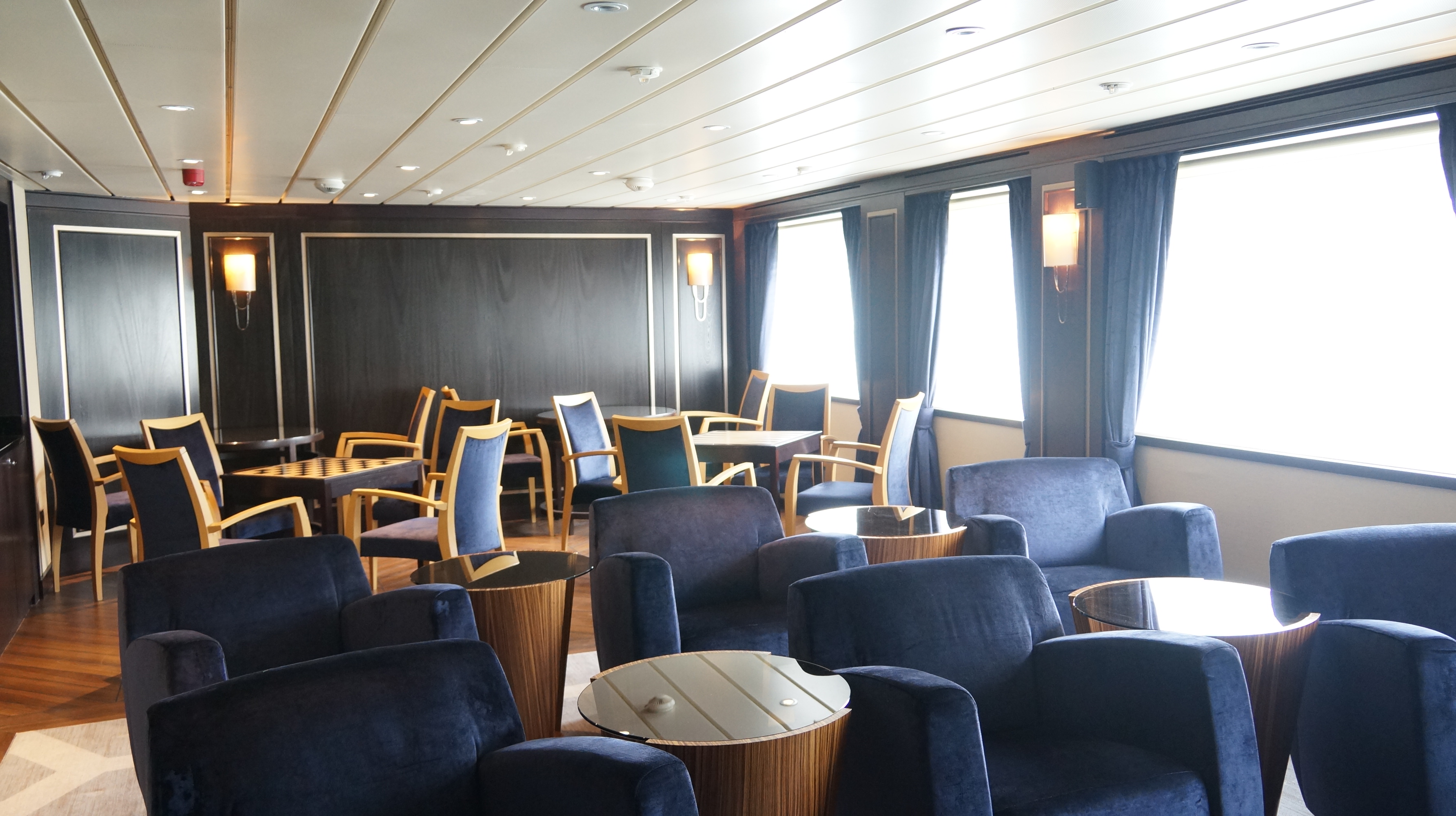
Screening Room
The ship’s card room is now the new Star Screening Room, where guests can view current movies.
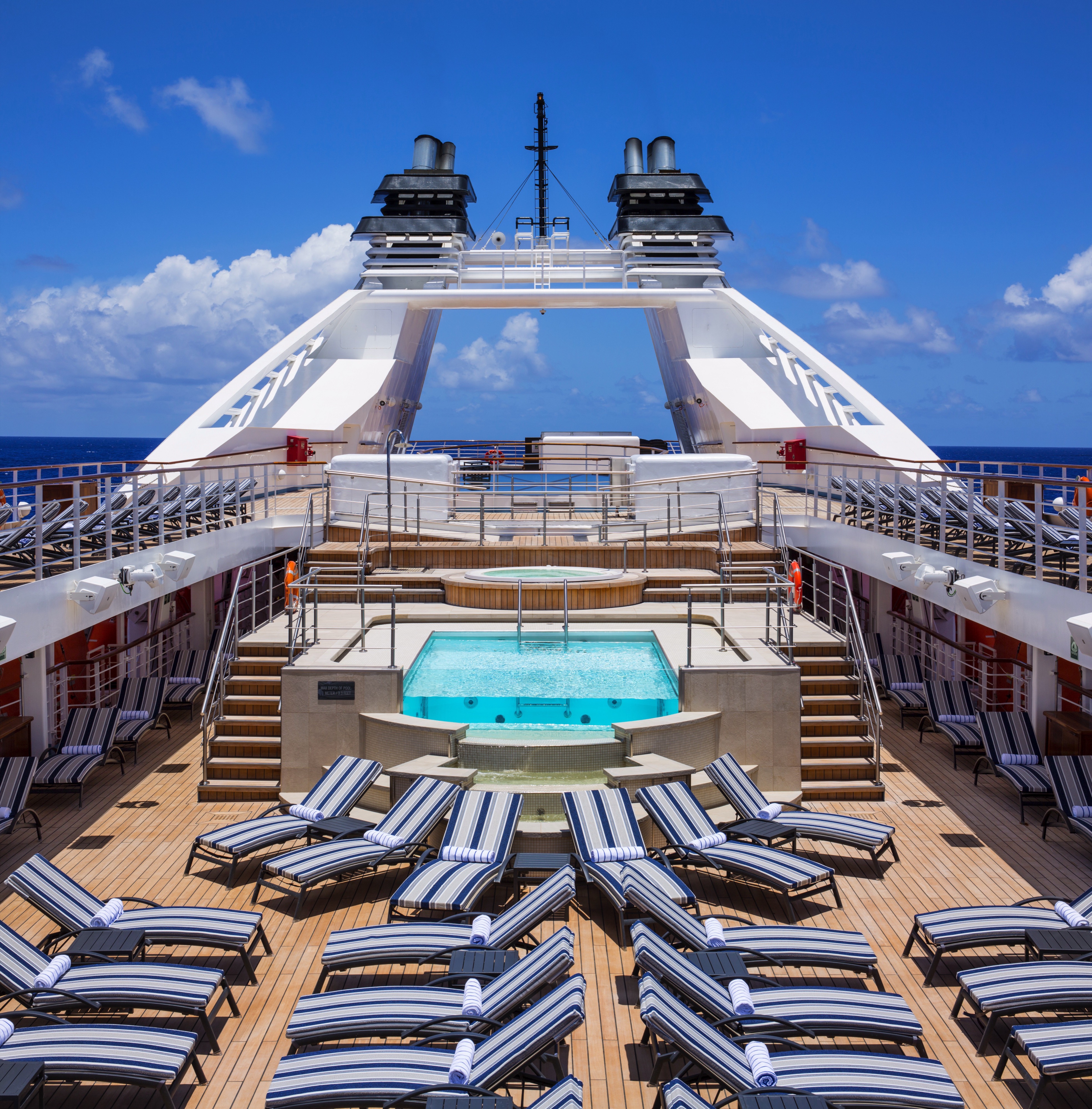
Sun Deck
The Sun Deck can be located on Deck 7.
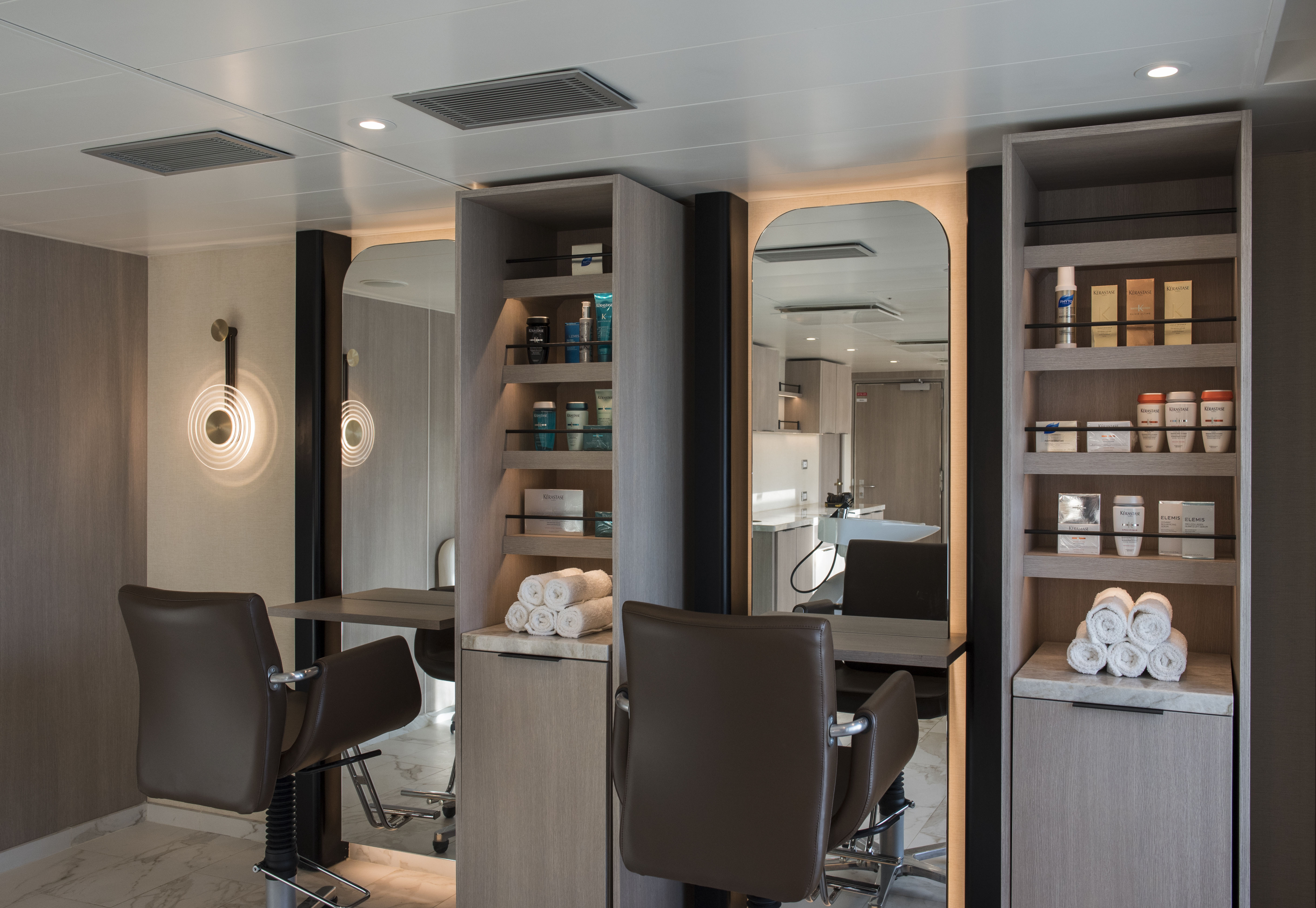
WindSpa
As you enter the hushed atmosphere of the newly-expanded WindSpa, you’ll feel every last care gently melt away. Maybe you’ll try a Hydralift facial or a new colour on your toes. Maybe you’ll surrender to the transformative power of a relaxing massage. With one of the highest crew-to-passenger ratios at sea, you will find yourself in the enviable position of never having to lift a finger.
The crew is happy to do whatever we can to make your time on board as pampered as possible. Please book spa appointments with the hotel manager once you’ve boarded your yacht.
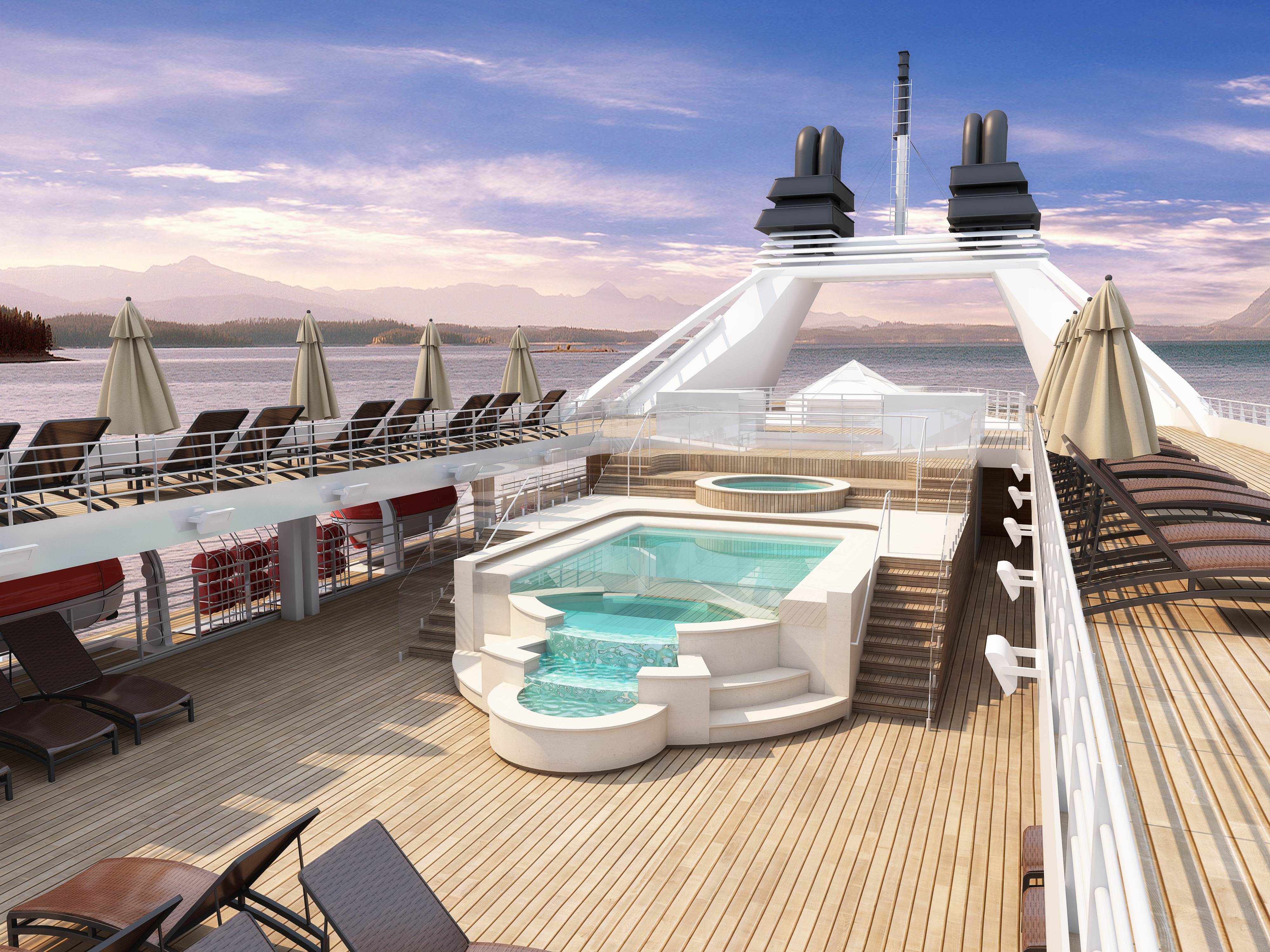
Health & Fitness Facilities
These include Watersports Platform, Whirlpools & Pool, and Beauty Salon.
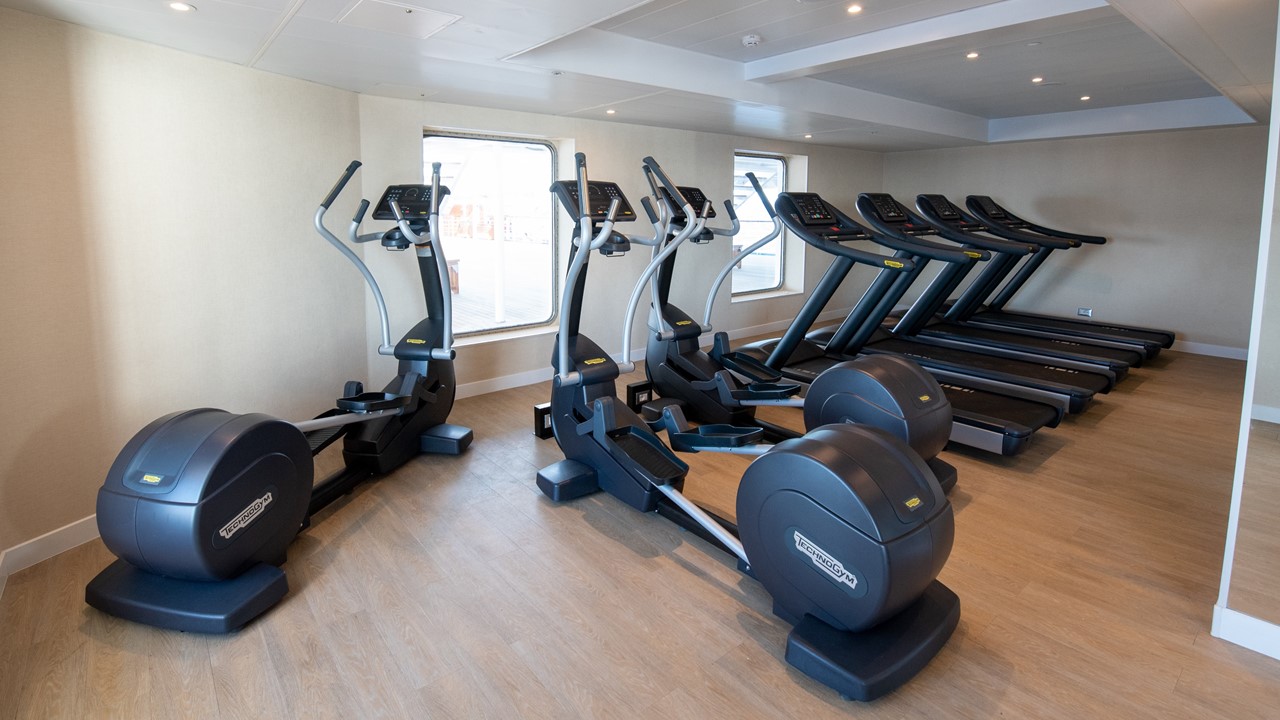
Fitness Centre
The fitness centre is located on deck 7.
Guests With Disabilities
Windstar does not discriminate against persons on the basis of disability. We seek, to the extent feasible, to accommodate the needs of persons with disabilities. There are no elevators on Wind Star and Wind Spirit nor were the ships originally constructed to be wheelchair accessible. As a result, these ships may be unsuitable for people relying solely on wheelchairs. The other yachts are equipped with elevators, but staterooms on Wind Surf are not wheelchair accessible. Also note, there is no elevator access to board the ship. Star Pride, Star Breeze, and Star Legend have modified wheelchair accessible suites available.
Certain ports require the ship to anchor; in this case guests must be ferried into port. Service Dogs are permitted onboard ships if prior arrangements have been made at time of booking. In limited situations where an individual with a disability would be unable to satisfy certain specified safety and other criteria, even when provided with appropriate auxiliary aids and services, we may find it necessary to ask the individual to make alternative travel arrangements. It is essential that Windstar is notified of any special medical, physical or other requirements you may have at the time of booking.
Age Restrictions
Windstar Cruises is unable to accommodate children under eight (8) years of age. All Guests under 21 years of age must be accompanied by a parent, guardian or chaperone who is at least 21 years old. Parents, guardians, and chaperones are responsible for overseeing the onboard conduct of minors. Alcoholic beverages will not be served to guests under age 21.
For family groups booking multiple staterooms, the minimum age for at least one person in each stateroom is 18 years of age, provided they are traveling with a parent, guardian or chaperone.
Dress Code
The less you bring the better. We suggest clothes that are light, cool, and made of natural fabrics like cotton and silk. You may wish to bring warmer clothing (layers are best), if you are traveling on an Ocean Crossing or an autumn Mediterranean cruise.
The Dress Code – from 7 am – 6 pm guests are welcome to dress as they please with the exception of no swimwear in all public lounges and restaurants and no clothing with offensive language or graphics that distract from the comfort and well-being of others. The general shipboard style is elegant, but relaxed including jeans and Bermuda/ walking shorts.
In the evening – after 6 pm when dining in Amphora, Stella Bistro or Cuadro 44 by Anthony Sasso, the dress code is country club-type clothing. For men – nice slacks, polo shirts, button down shirts, shoes other than athletic shoes. Designer denim jeans without rips or holes or are multi-coloured are also acceptable. Sport coats are optional. Ties are not needed. For women – nice pants, skirts, tops, casual dresses, sundresses, nice sandals or casual shoes and designer denim dress jeans not ripped or multi-coloured or having holes. Blazers are optional.
No assigned seating in Amphora or Veranda restaurants. And what can be more casual than merely signing for onboard purchases? You will feel like this is your ship, your personal yacht. The environment inspires the attitude. Reservations are required for Candles and can be made on board.
For those guests traveling to Alaska, it’s important to wear the right gear. We have partnered with the leading expedition outfitter to offer an online Alaska clothing and accessories service that ships directly to your ship. You’ll find all the right gear for Alaska, packing lists, clothing tips and our limited-edition Alaska inaugural season jacket here..
Premium Beverage Package
While all non-alcoholic beverages are complimentary, you may enjoy a pre-dinner cocktail under the setting sun or a champagne toast at the evening Sail Away with our beverage packages for wine, beer, cocktails and more. Find the perfect wine pairing with your meal and then end the night sipping scotch as you contemplate the stars.
Topmast Discoveries Beer & Wine Package – $49 per person per day An extensive package of diverse and intriguing wines from traditional European winegrowing terroirs to New World regions. Includes domestic and imported beer and 33 varieties of wine by the glass.
Captain’s Exclusive Beverage Package – $59 per person per day The ultimate beverage package and the perfect way to try new drinks for a bit of added adventure. Includes all domestic and imported beers and 33 varieties of wine/sparkling/champagne by the glass PLUS cordials, liqueurs, apertifs, cocktails and even mini bar items. (Cocktails based on house & select brands)
The All-In Package – From $79 per person per day. Have it all by making it an all-inclusive voyage with unlimited beer, wine & cocktails, unlimited Wi-Fi and gratuities, including the 15% beverage service charge. A convenient bundle that saves time and money, pays most of your expenses upfront and avoids the European VA Tax when pre-purchased. The All-In Package is sold per person and must be purchased up to 7 days prior to departure at $79.
The Topmast, Captain’s Exclusive and $89 All-In Packages are sold per person and must be purchased in advance or during the first 2 days of your cruise and for the full duration of the cruise. Prices for the Topmast and Captain’s Exclusive Packages do not include the standard 15% beverage service charge. Package prices are inclusive of applicable taxes. The minimum drinking age aboard Windstar Cruises is 21 years old.
Your Windstar Voyage Includes
-
All meals in all venues at all times, including room service menu available 24 hours
- All non-alcoholic beverages, including cappuccino, espresso, and other specialty non-alcoholic drinks
- Welcome cocktails at reception
- All onboard entertainment
- Unlimited use of Fitness Center
- Unlimited use of all water sports equipment
- Informative nightly port talks and destination briefings
Personal Onboard Laundry Service
Laundry service is provided on board at a nominal charge. Dry cleaning is not available. Laundry Service Packages must be added by the first day of the cruise and will be priced by the total number of cruise days. Pricing is inclusive of applicable taxes.
Food Allergies and Special Dietary Needs
Here at Windstar we are committed to offering our guests healthy food selections. We offer vegetarian selections and lighter fare options, seeking to provide the freshest, top quality foods handled with the utmost care. If you have food allergies or special dietary needs, there are several ways to notify us prior to boarding the ship.
It’s important to let us know about your special request when you book your cruise to help us plan and prepare for your meals. Your travel professional will enter this information in Special Requests. It is then noted on your booking and your ship will be notified, although it will not appear on your invoice or in My Windstar.
Special Request Dietary Needs include:
- Alcohol Free
- Celiac
- Dairy Free
- Diabetic – Diet Controlled
- Diabetic – Insulin Controlled
- Food Allergy
- Gluten Free
- Lactose Intolerant
- Low Carbohydrate
- Low Cholesterol
- Low Protein
- Low Sodium
- Other Dietary
- Sugar Free
- Vegan
- Vegetarian
- Wheat Free Diet
Unfortunately we are unable to accommodate Kosher or Halal meals. If you have specific dietary needs– such as – lactose intolerant requiring almond milk – please complete a Special Requirements Information Form. Return this information via:
1. Mail to Windstar Vacation Planning at 2101 4th Ave., Suite 210, Seattle WA 98121
2. Fax to 206-733-2790
3. Call 866-568-0982 to speak with a Vacation Planner in person
4. Send an email to info@windstarcruises.com
When you embark the ship please feel free to ask to speak with the Executive Chef about your specific request.
If you have any additional questions or concerns please call us during business hours at 866-568-0982.
Smoking Policy
Smoking or vaping is not permitted in any of the staterooms, suites, or public spaces, including all restaurants and corridors. Smoking and vaping is permitted on the outside decks in designated smoking areas only. Smoking cigars is permitted in a specific designated area on each yacht, however, only sold on board the Cigar Room of Wind Surf.
Internet Access & Usage Plans
As part of our onboard service we offer internet access on our ships. We recently modified our internet usage packages from minutes to the amount of data used.
How does internet access at home differ from access at sea?
As with all ship communications, the internet service is operated through satellites. While you are most likely used to a fast internet connection at home, in hotels or other local Wi-Fi spots, internet at sea can be slow, and at times, disruptive. The only option available is satellite connection, which is costly and limits the amount of data used. The connection is also influenced by weather, the movement of the ship, and in the case of our sailing ships, blockage from our sails passing in front of the satellite dish.
It is not recommended for downloading movies or large files due to system speed. In some areas the service can be interrupted by weather or the ship’s position. We recommend that guests use the service only for emails or small files.
Why did the Internet Usage Plan change from minutes to megabytes?
Windstar modified the Internet Usage Plan in order to provide guests with the ability to access the same number of sites and/or read the same number of emails, regardless of connection speed. The previous plan was based on the number of minutes the guest was accessing the internet, regardless of connection speed. At times, factors like bad weather, ship speed, overcast conditions, all contributed to slow and/or disrupted connections.
What is a megabyte (MB)?
Any file, whether it’s a spreadsheet, word document, or email, takes up electronic storage space, otherwise known as bytes. The larger the file, the greater the number of bytes. The standard increment of measurement is bytes, kilobytes (1000 bytes), megabytes (1,000,000 bytes) and gigabytes (1,000,000,000, bytes).
As a frame of reference, an 80-word email is around 10 kilobytes, while a typical web page is approximately 1 megabyte.
What type of Internet Usage Plans are available?
The Email Plan $60
This plan gives you 200 MB of data to use during your cruise. This plan is recommended for people who will be checking email and doing very limited browsing. The estimated minutes range from 15 to 60.
The Surfing Plan $120
This plan gives you 500 MB of data to use for additional browsing and small file transfers (such as posting pictures to a social media site). The estimated minutes range from 90 to 360 (approximately 5 hours).
The Unlimited Plan –
Unlimited Internet Package
- 7 Day Cost $245
- 8 Day Cost $280
- 9 Day Cost $315
- 10 Day Cost $350
- 11 Day Cost $385
- 14 Day Cost $490
- 15 Day Cost $525
This plan gives you unlimited internet access. You have no worries about how much time you spend on the internet.
How can I get internet access on board?
Guests can purchase Internet Usage Plans prior to their cruise through a Vacation Planner or on board at Reception. These plans can be used on personal laptops or smart devises that are Wi-Fi enabled.
Computers for public use are available on board.
* Please Note: All packages only allow for one device at a time to be connected to the internet.
Please contact a Vacation Planner if you have questions.

Deck 8
- Yacht Club Café & Library (1)
- Star Bar (2)
- Star Grill by Steven Raichlen (3)

Deck 7
- Bridge (4)
- World Spa by Windstar (5)
- Fitness Centre and Motion Studio (6)
- Pool and Whirlpool (7)
- Veranda/Candles (8)

Deck 6
- Star Boutique (9)
- Cuadro 44 by Anthony Sasso (10)
- Compass Rose (11)
- Owner’s Suites
- Star Porthole Suites
- Star Balcony Suites
- Deluxe Suite
- Star Ocean View Suites
- Balcony Suites
- Owner’s Suite

Deck 5
- Whirlpool (12)
- Reception (13)
- Destination Office (14)
- Screening Room (15)
- Lounge (16)
- Classic Suites
- Ocean View Suites
- Balcony Suites
- Deluxe Suite
- Star Balcony Suite
- Star Ocean View Suite
- Ocean View Suite – Accessible Suites (548, 550)

Deck 4
- Star Ocean View Suites
- Balcony Suite
- Ocean View Suites – Accessible Suites (448,450)
- Deluxe Suite

Deck 3
- Watersports Platform (18)
- Amphora Restaurant (17)
- Medical Facility (19)
- Star Porthole Suites
